
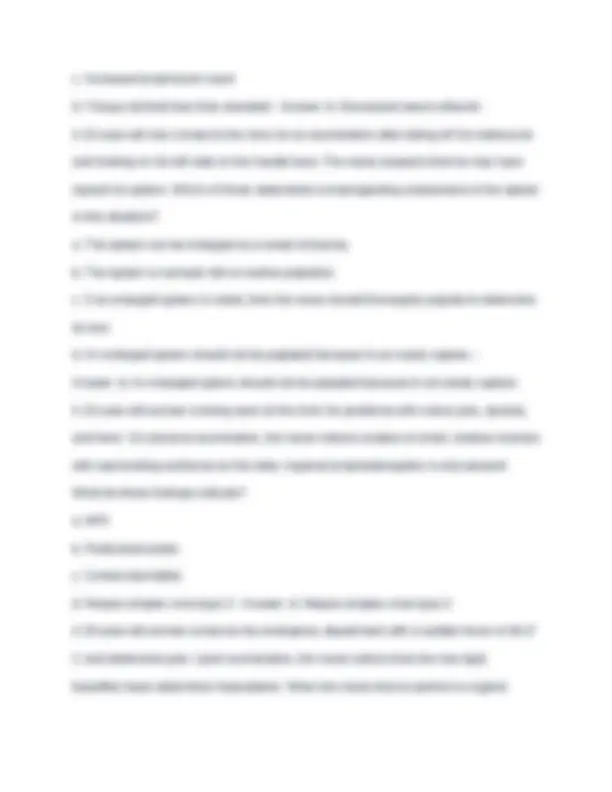
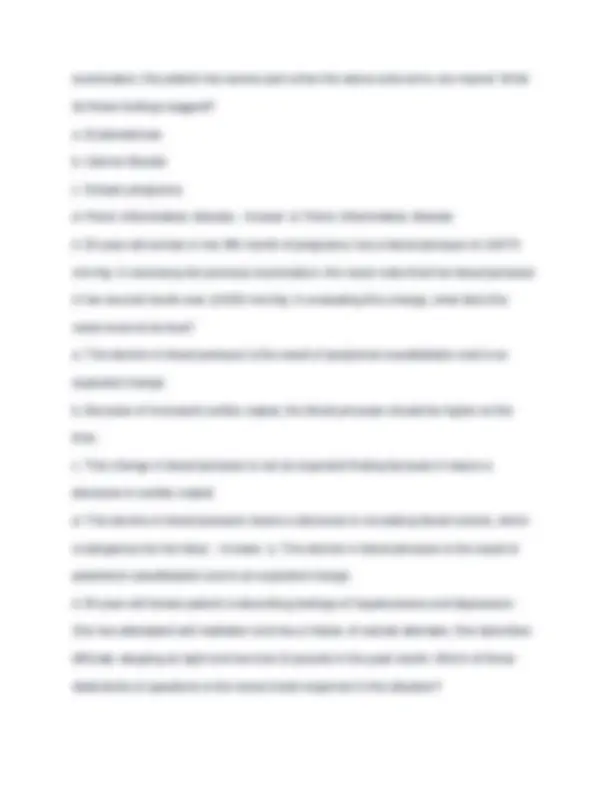
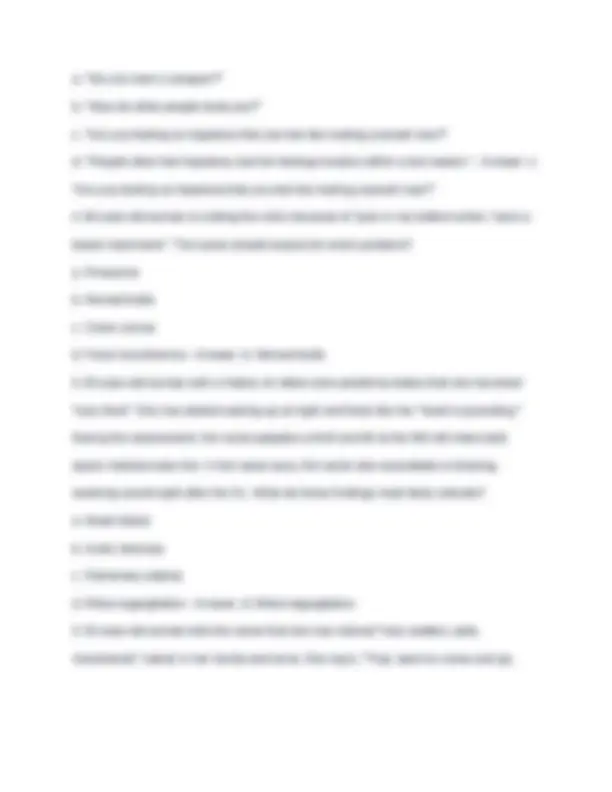
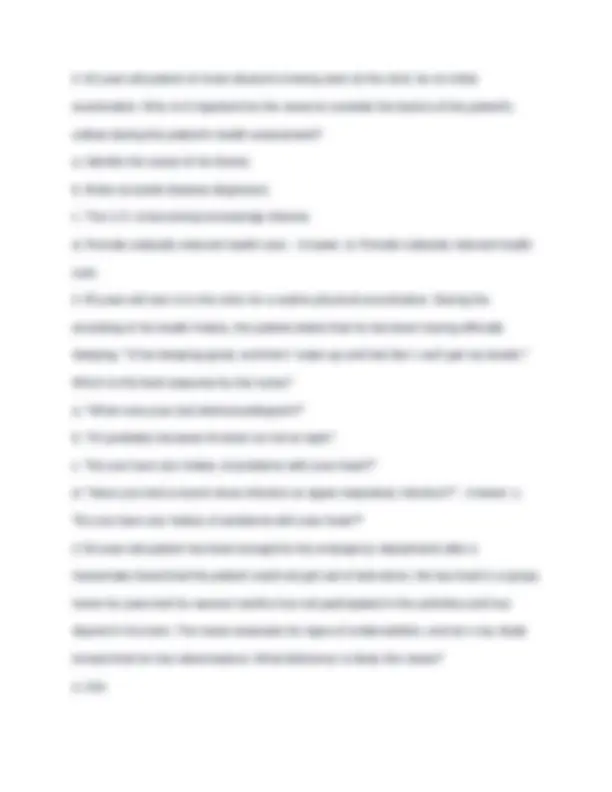
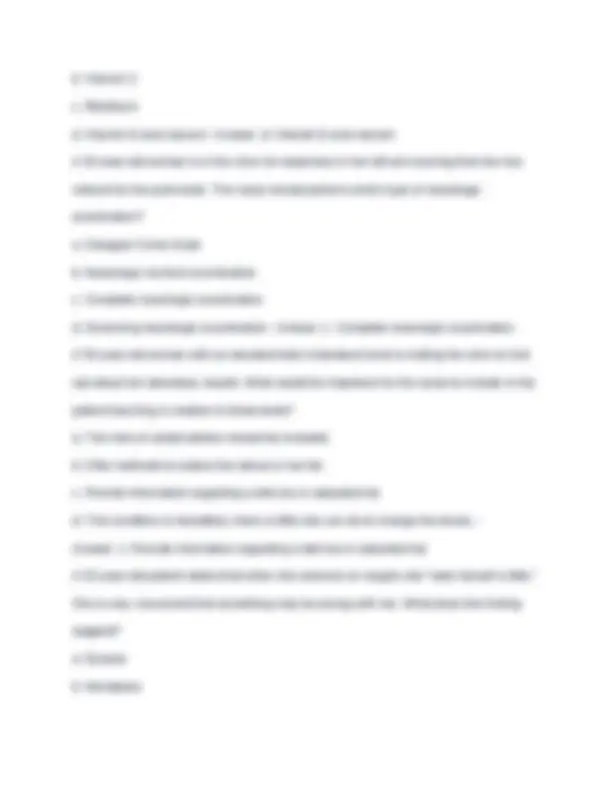
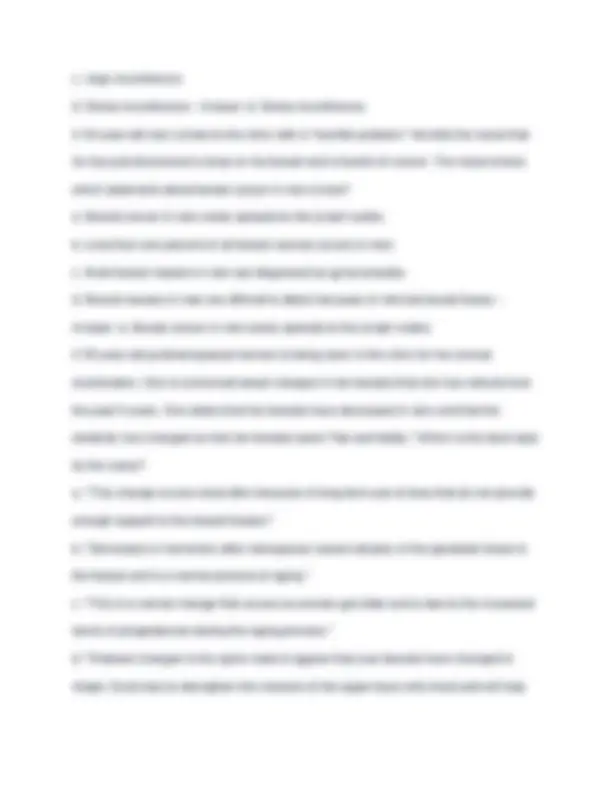
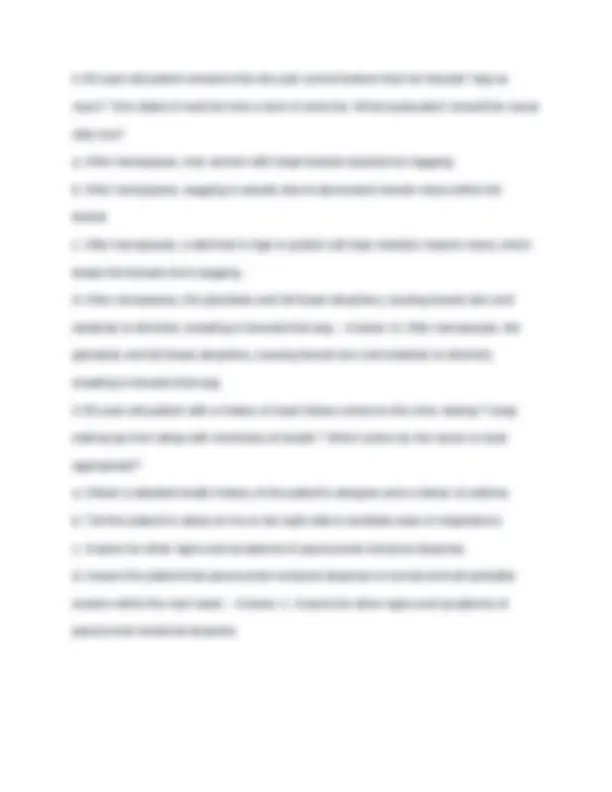
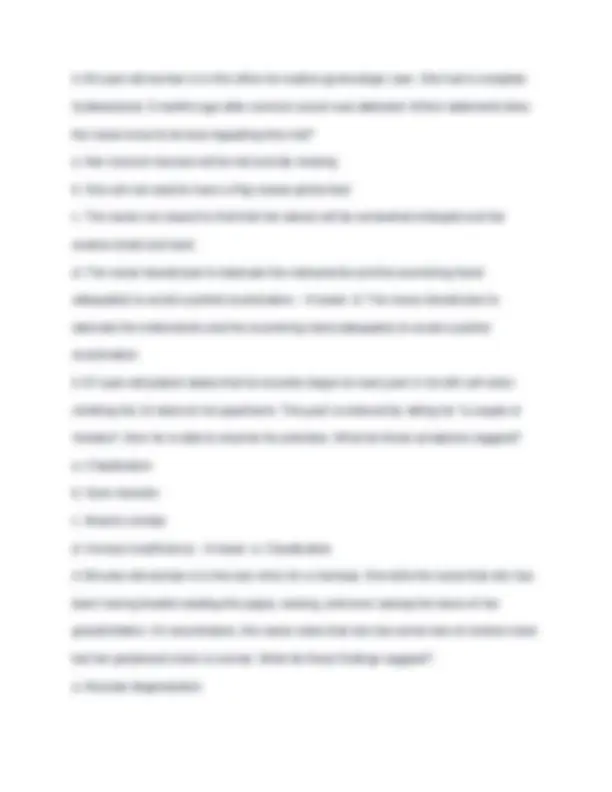
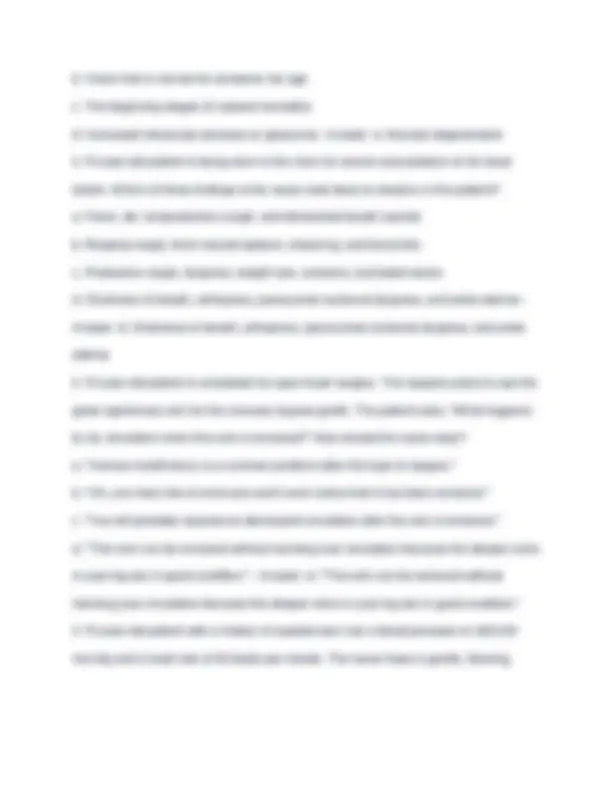
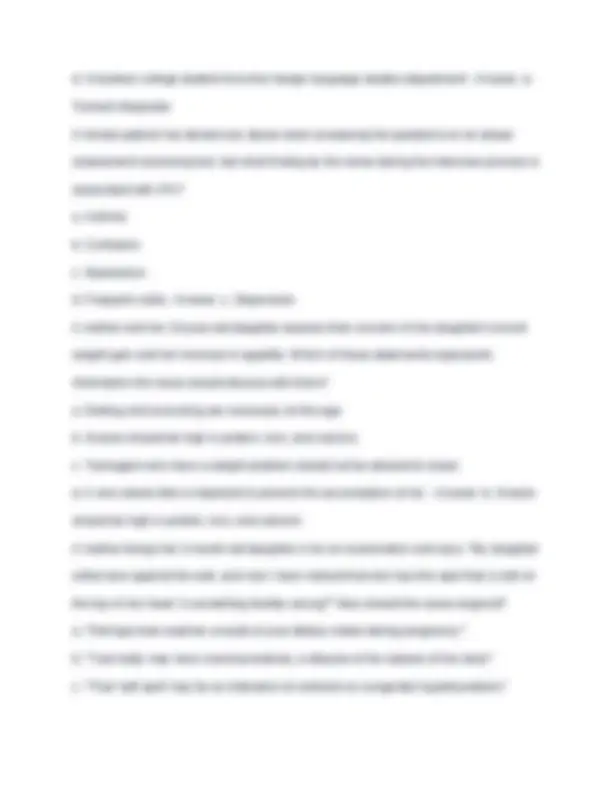
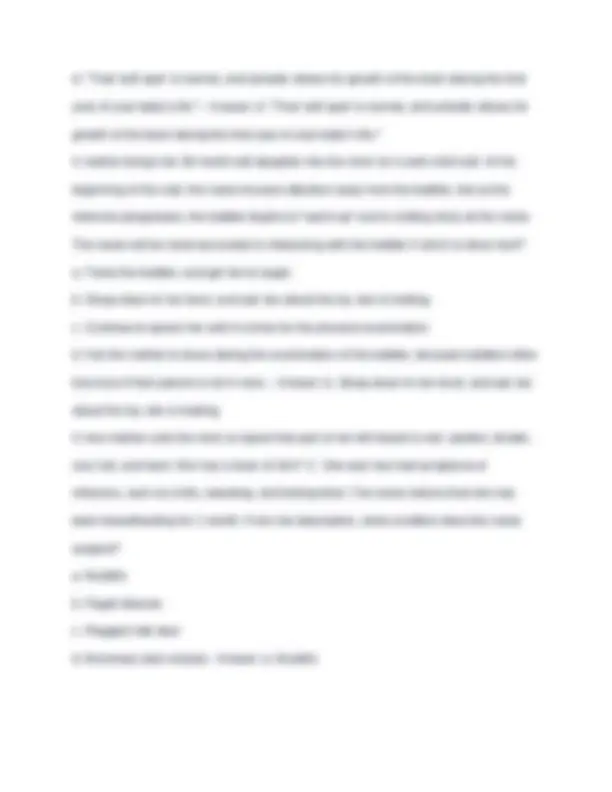
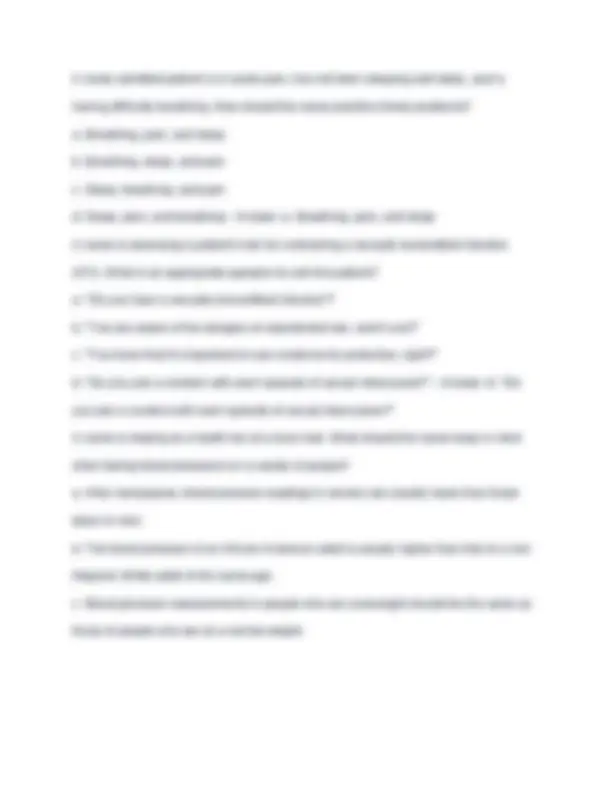
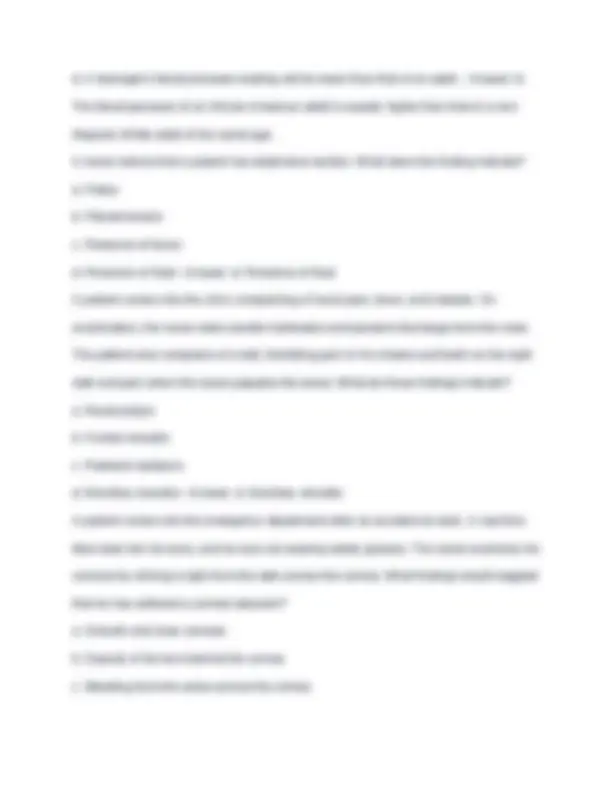
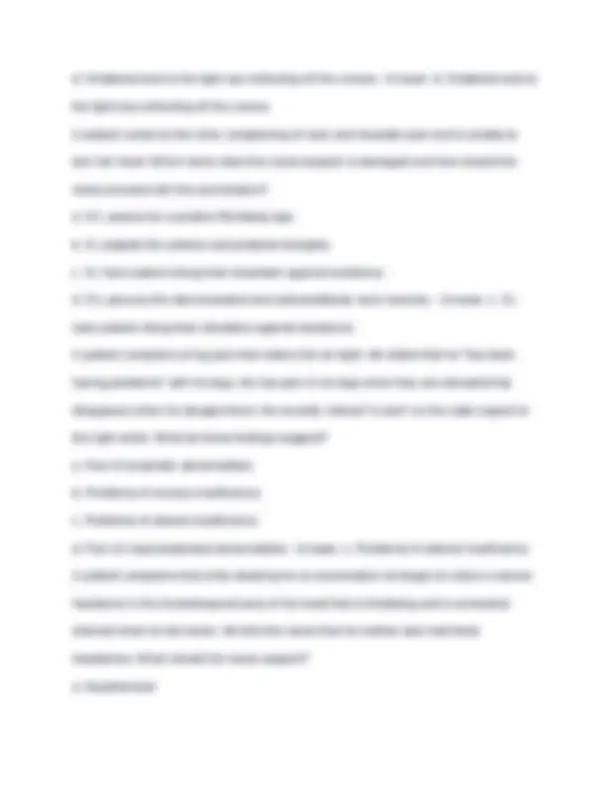
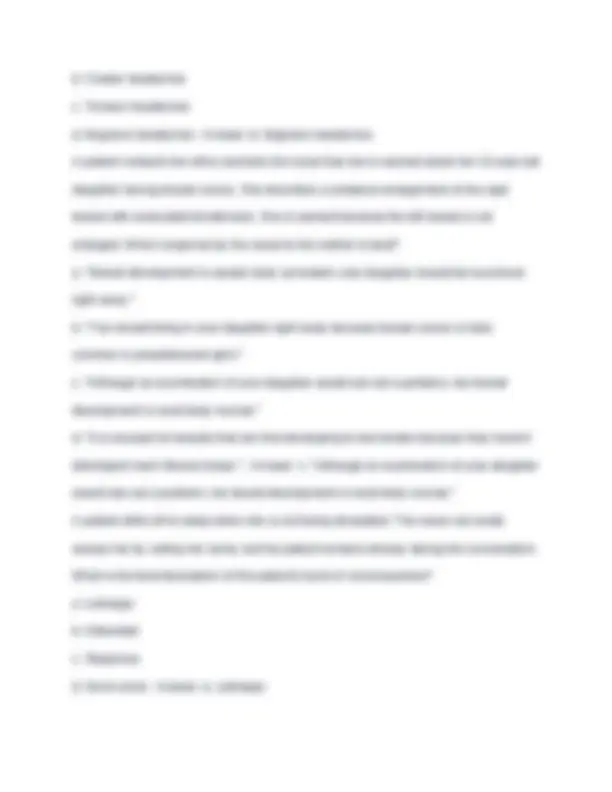
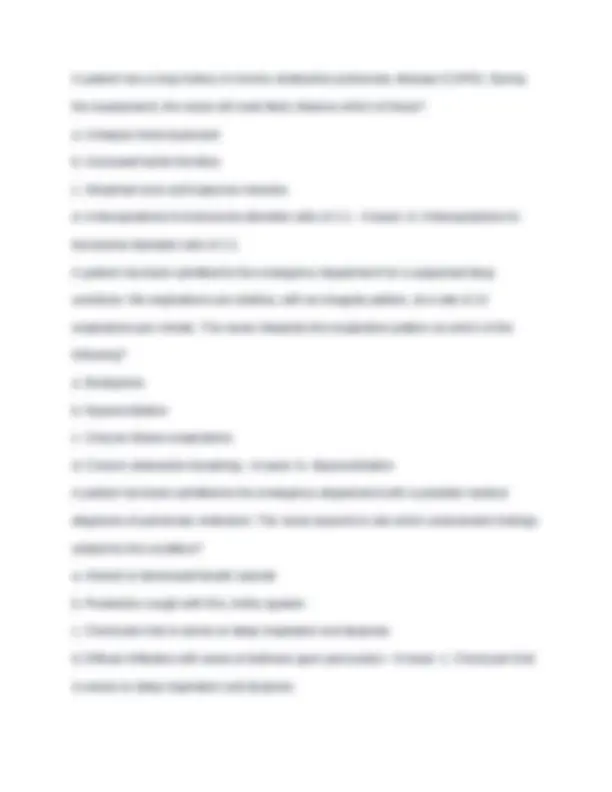
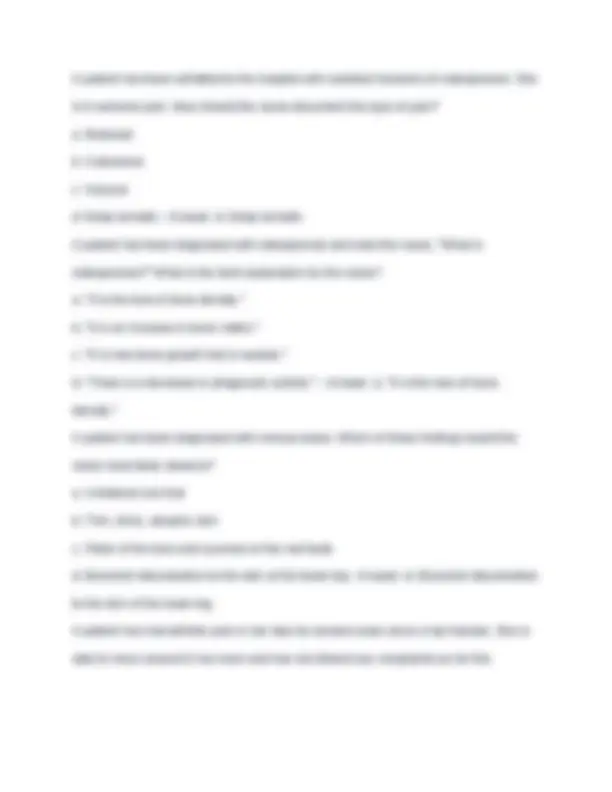
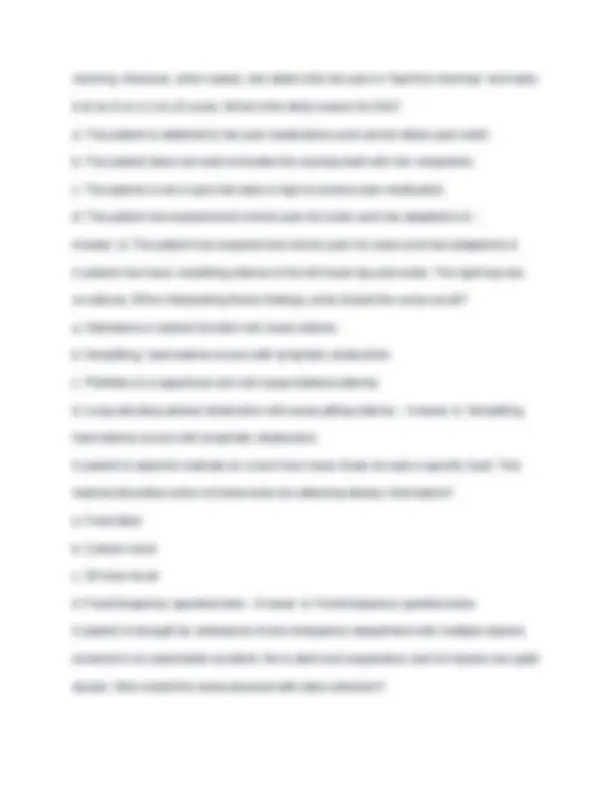
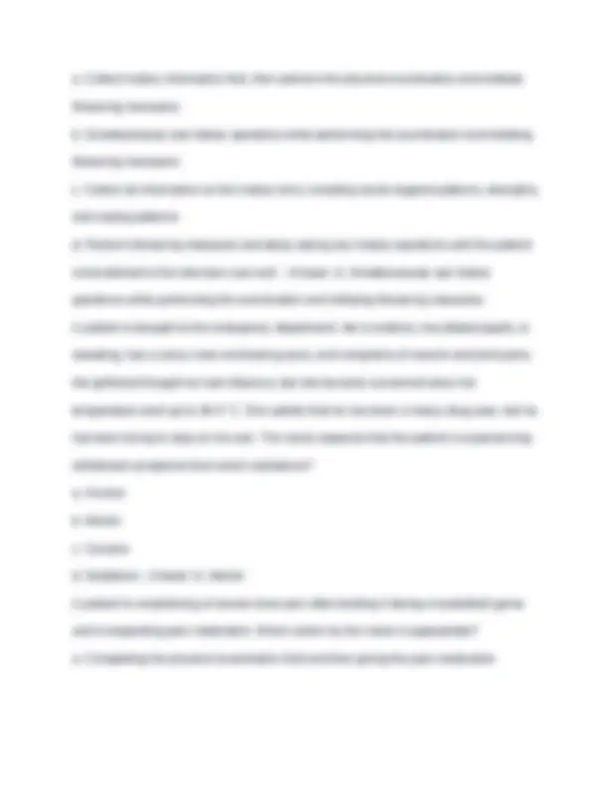
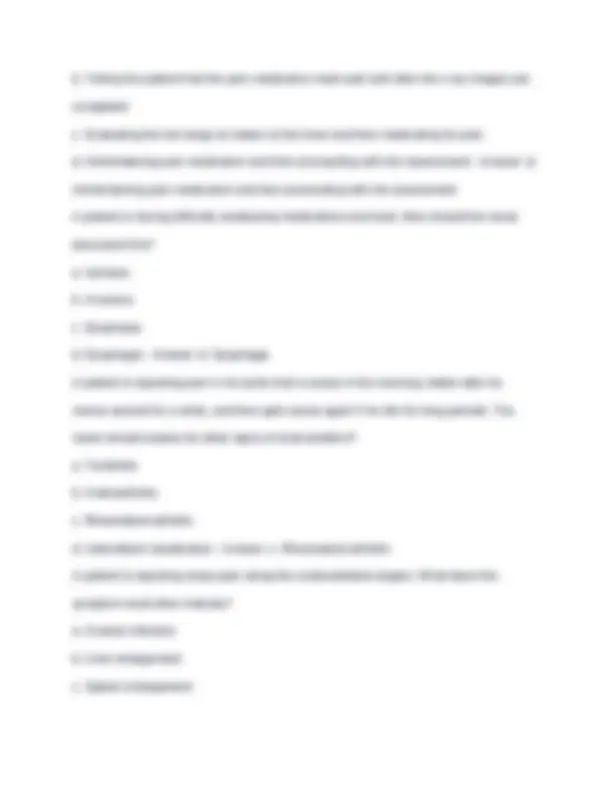
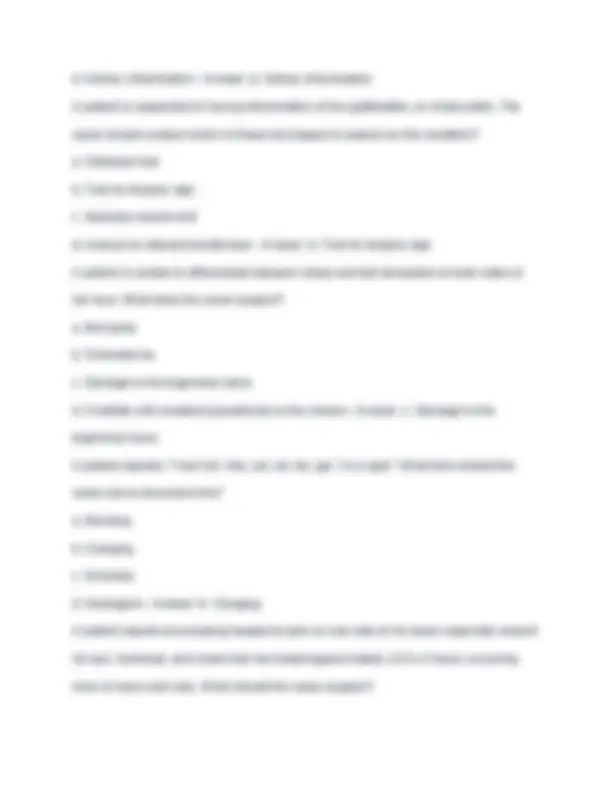
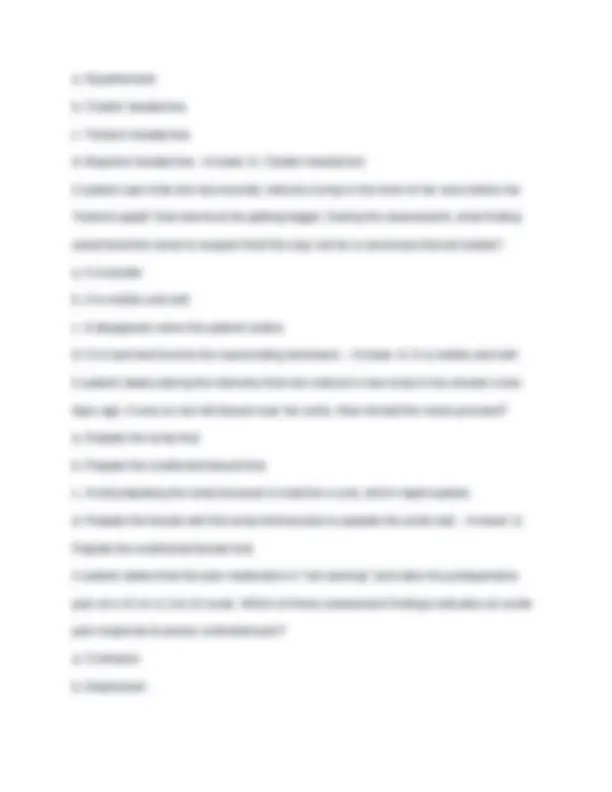
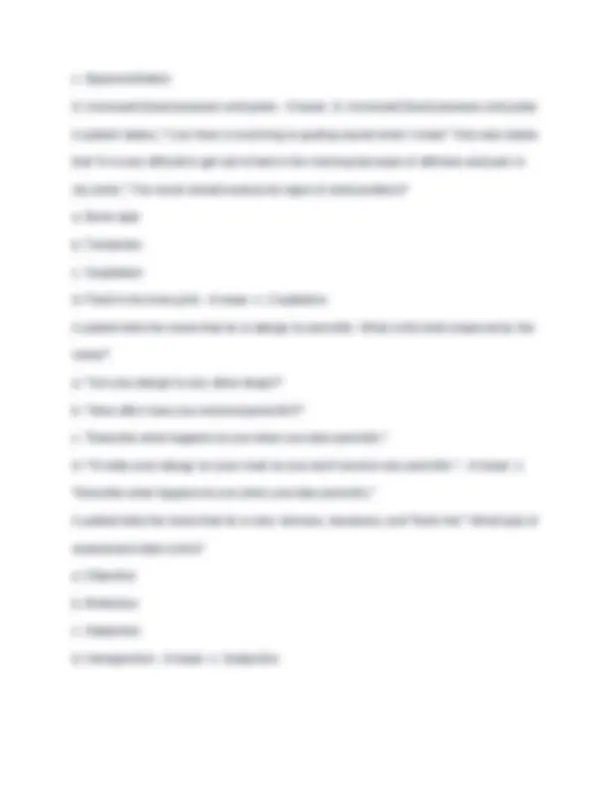
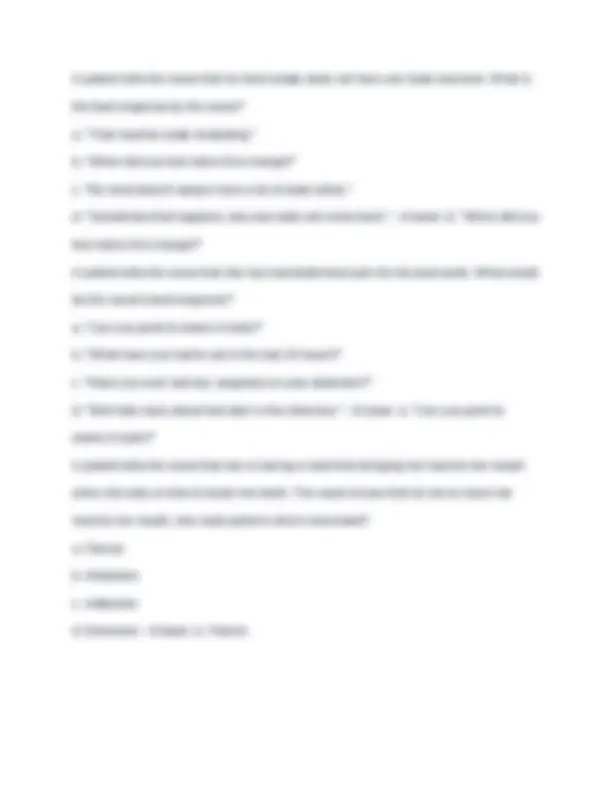
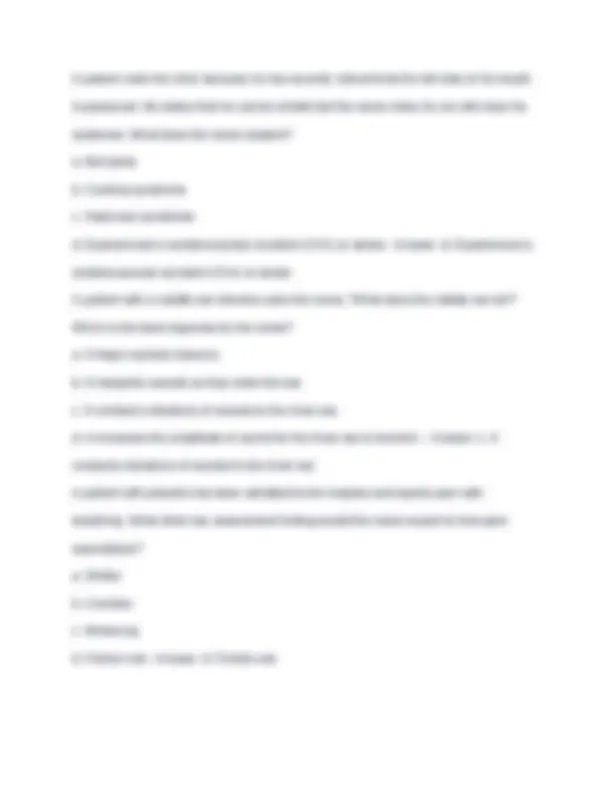
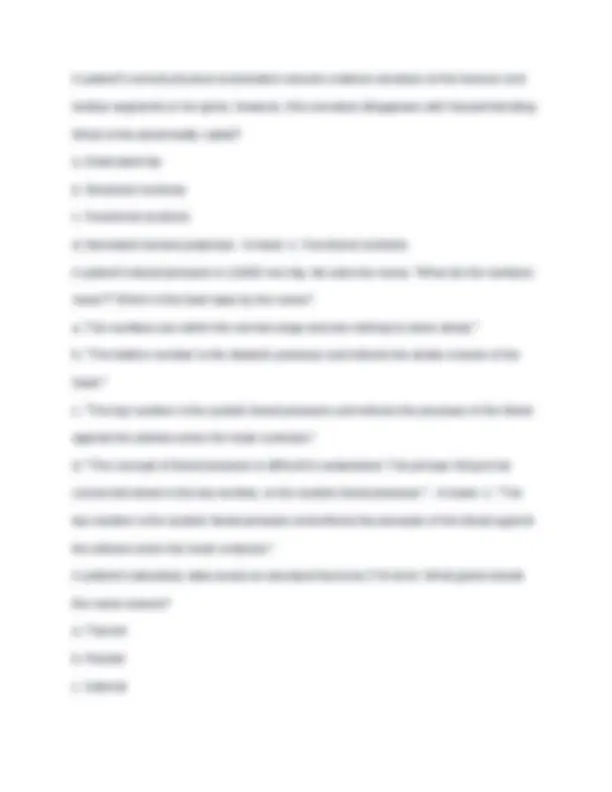
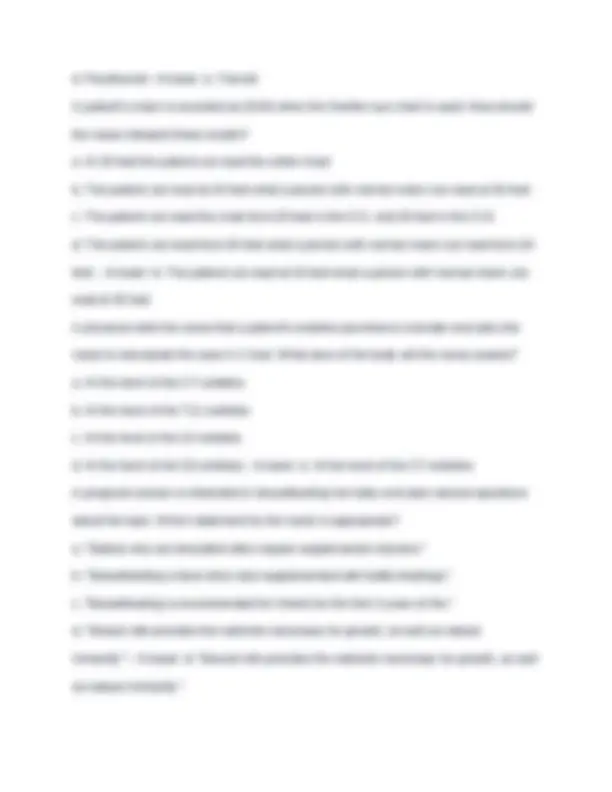
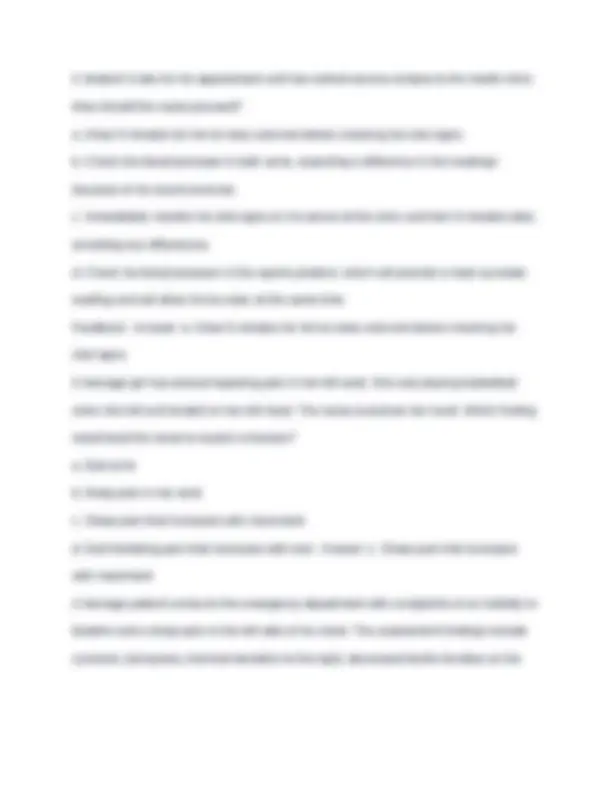
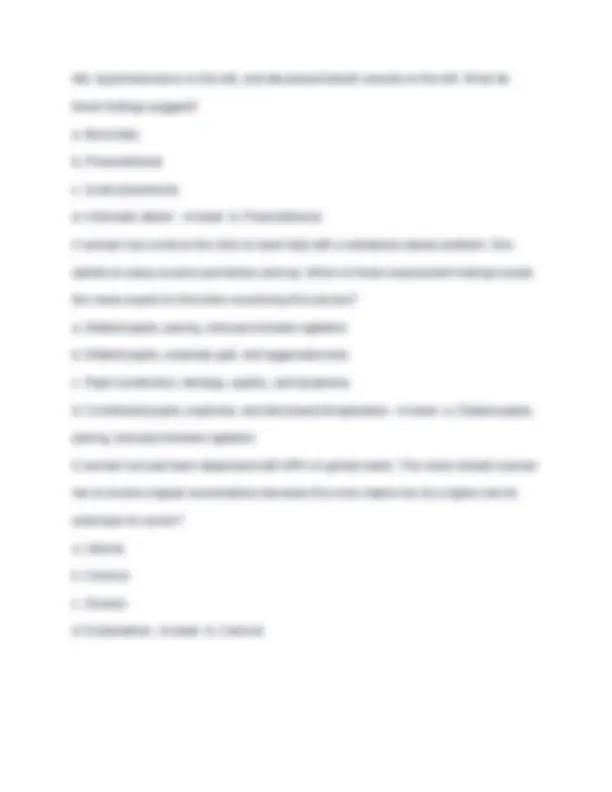
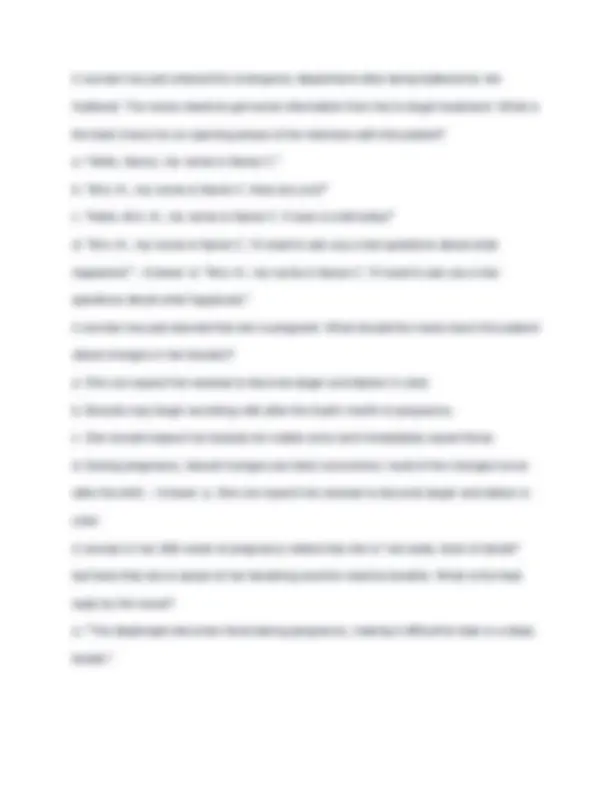
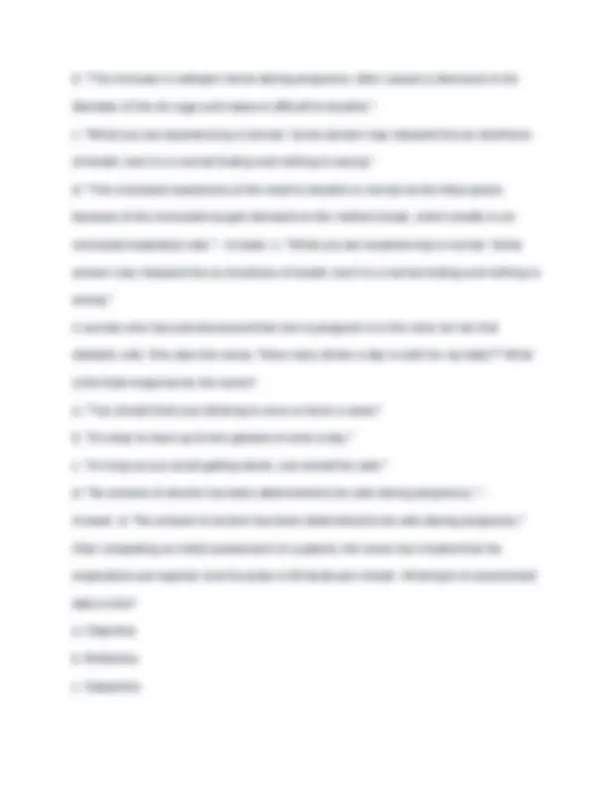
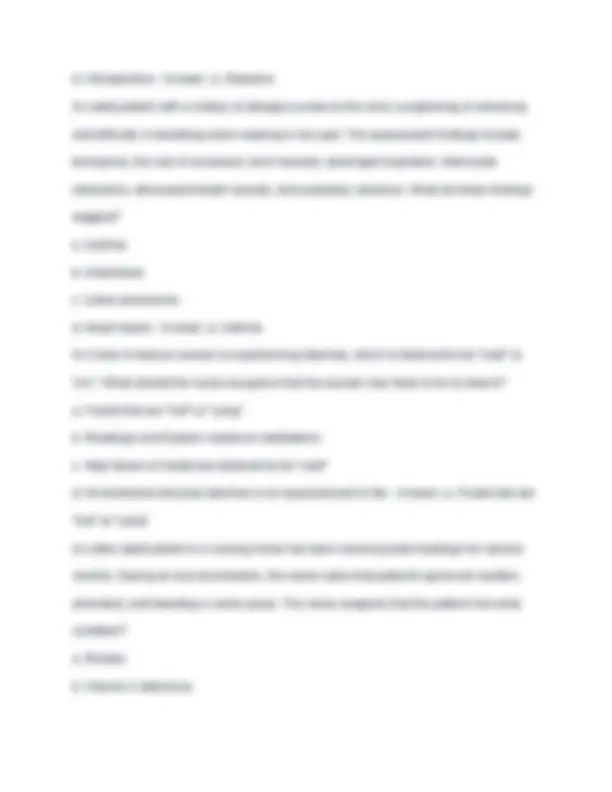
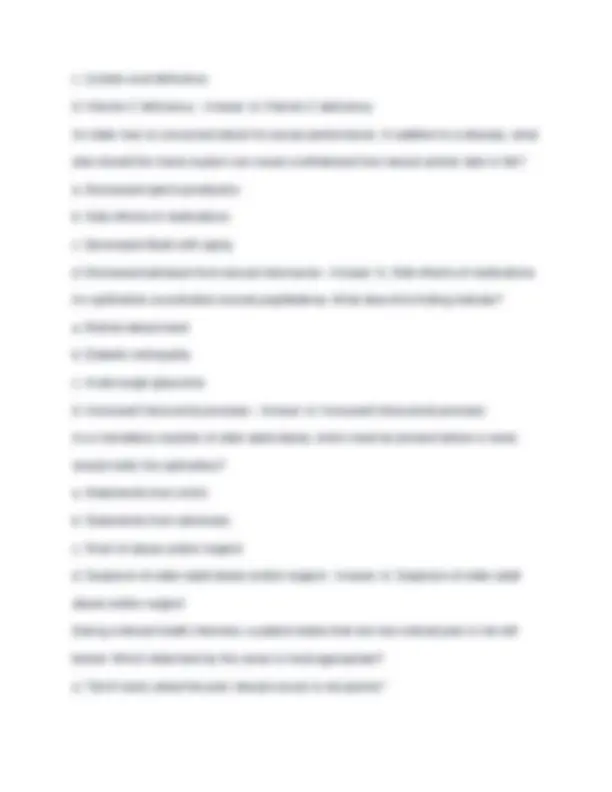
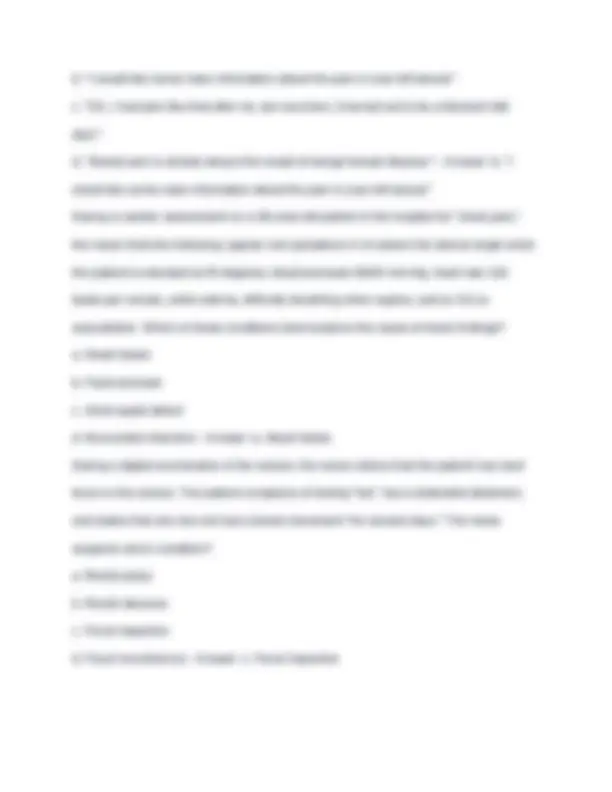
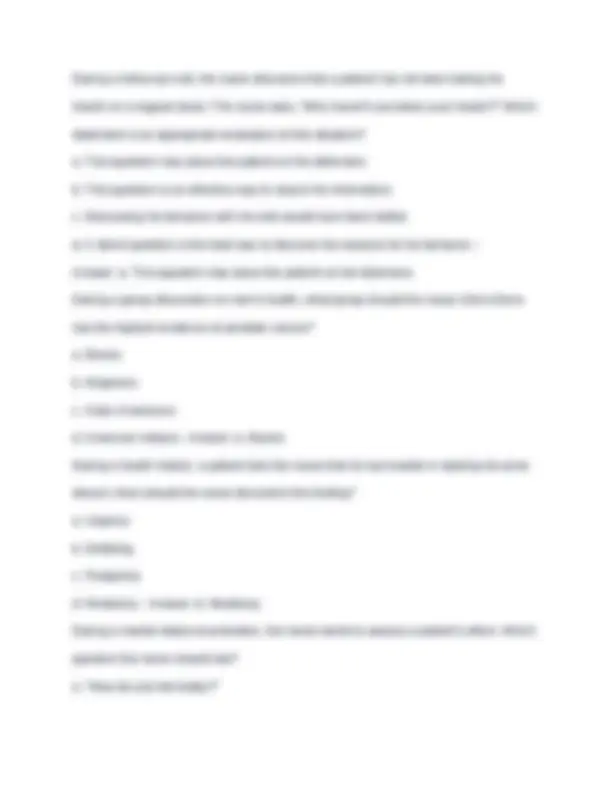
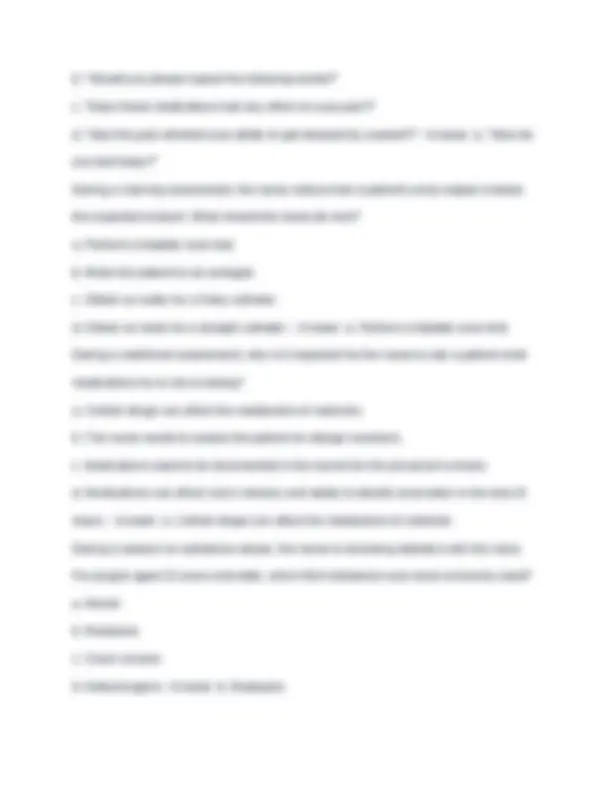
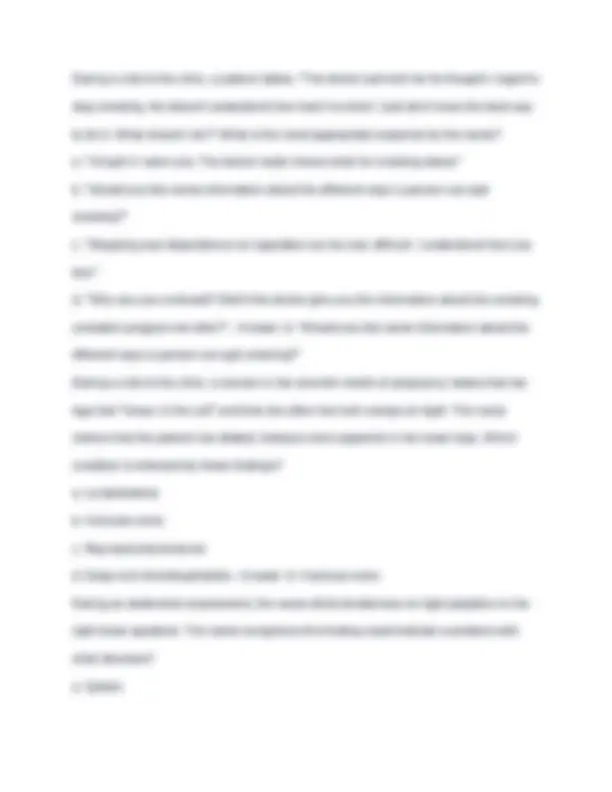
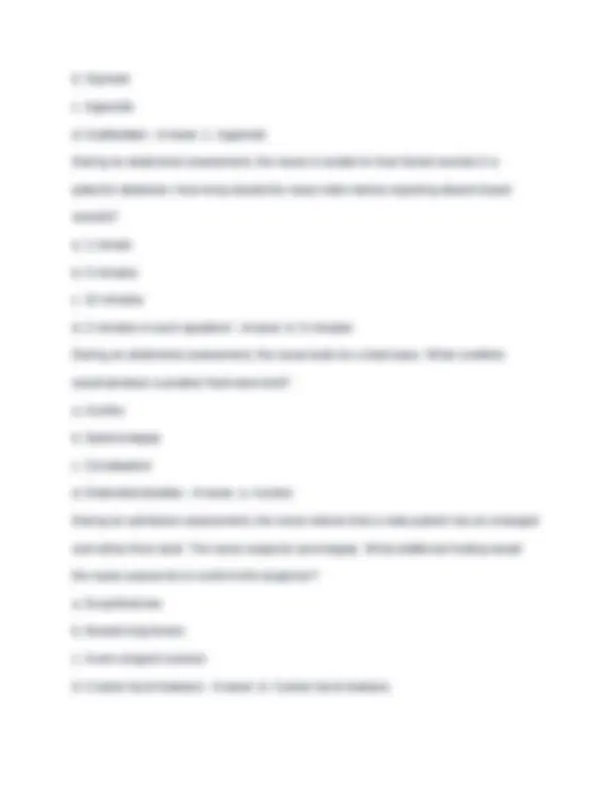
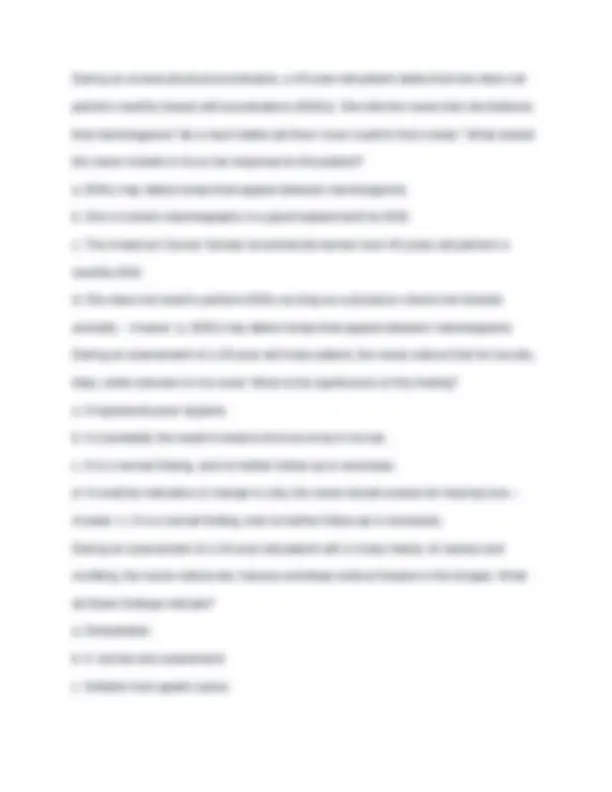
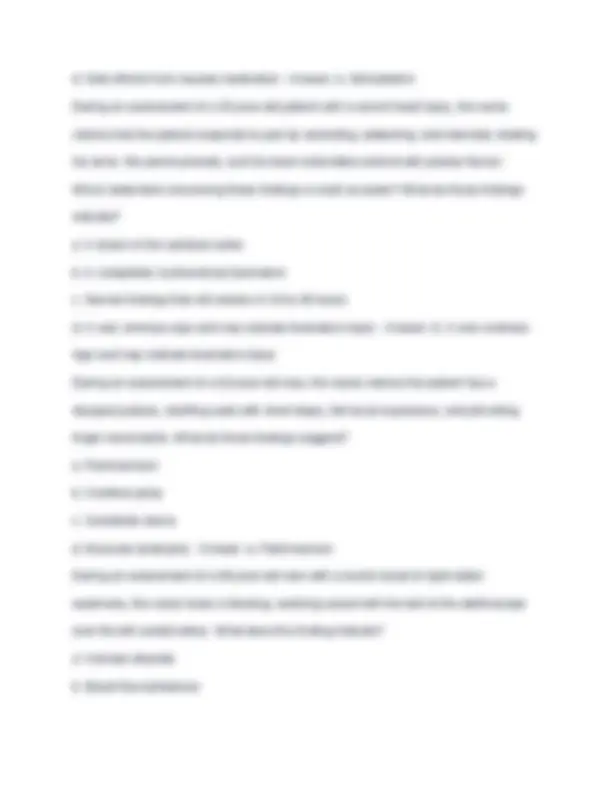
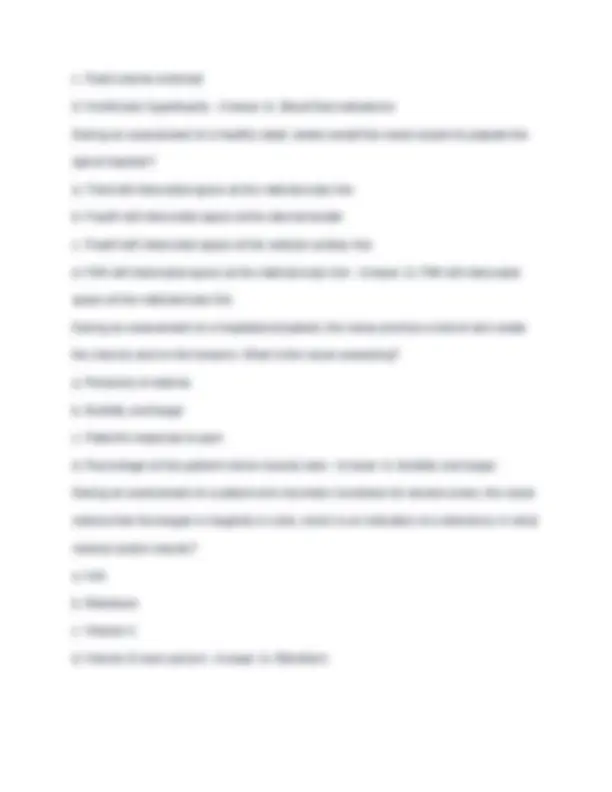
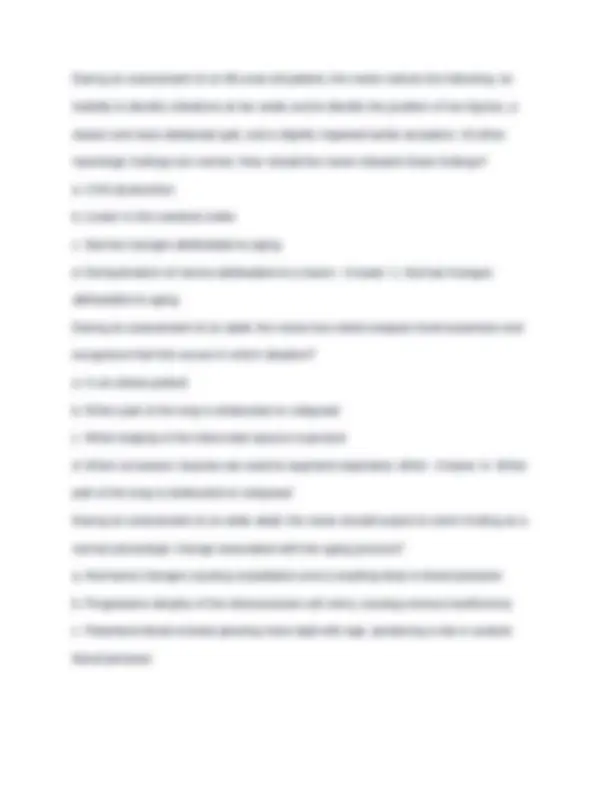
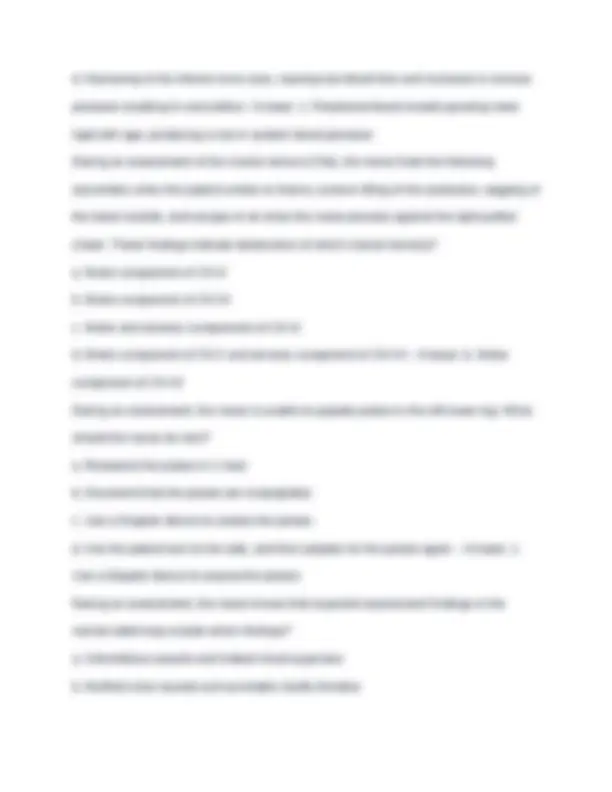
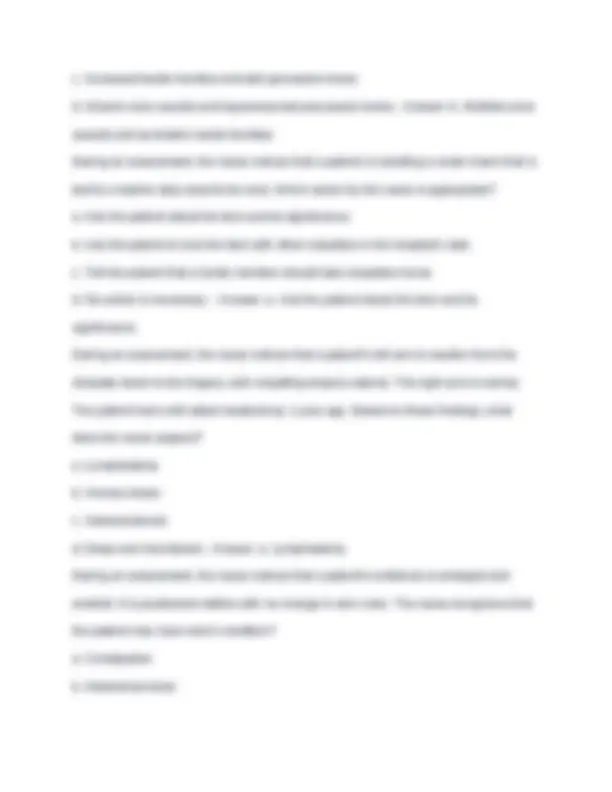
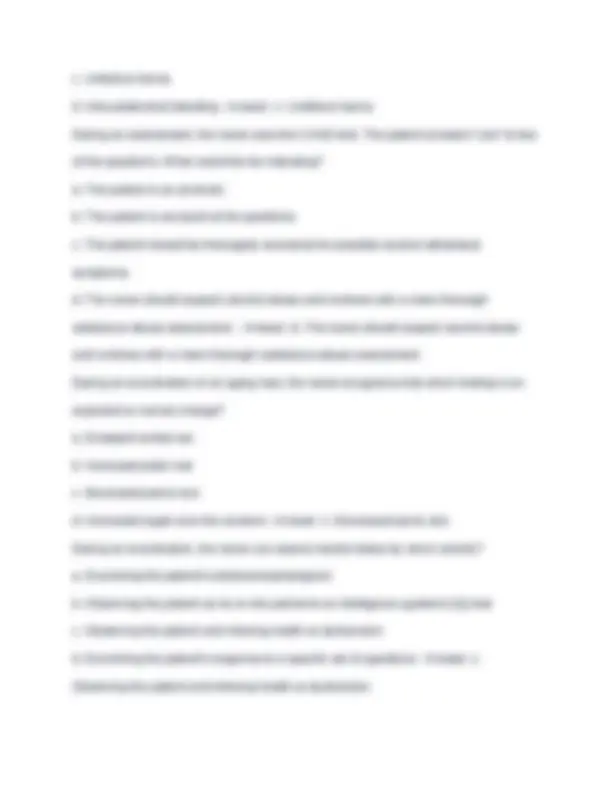
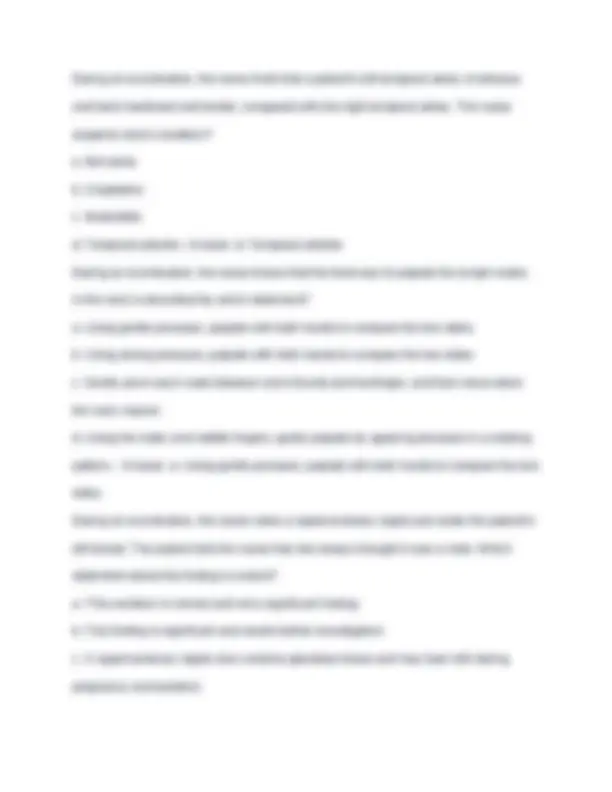
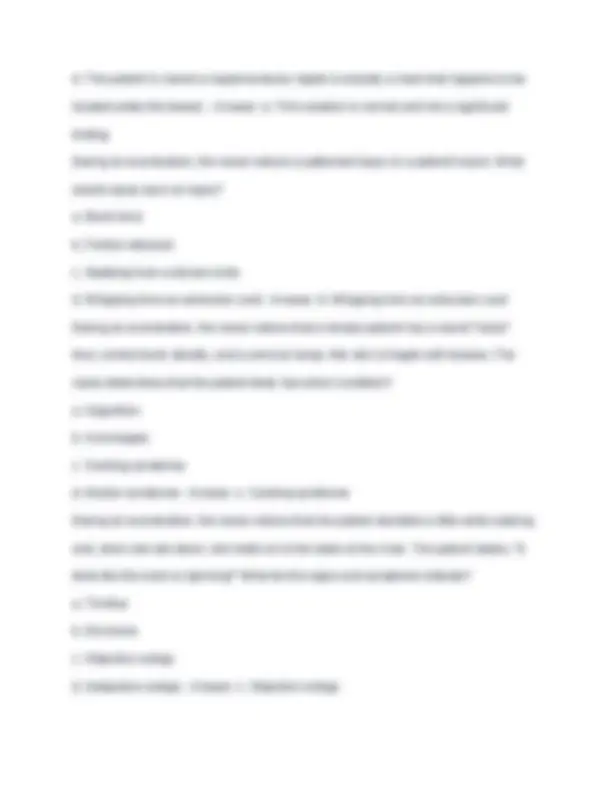
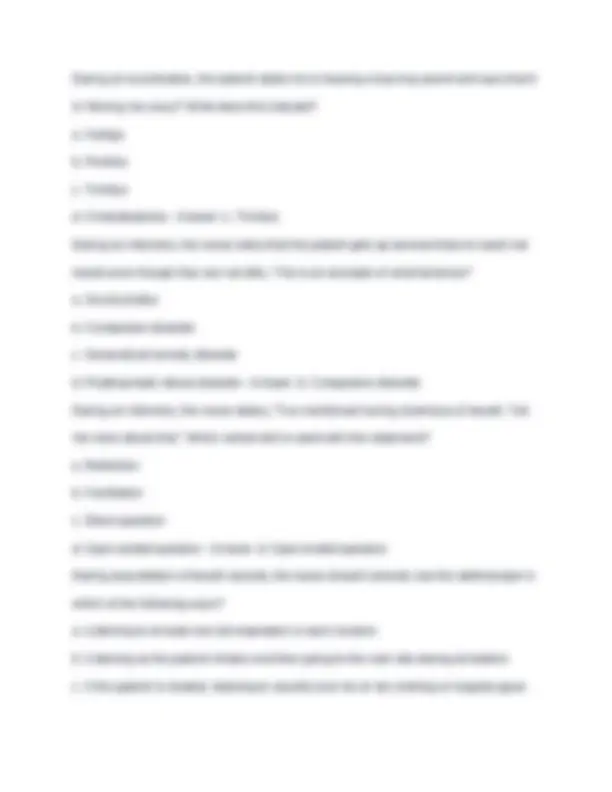
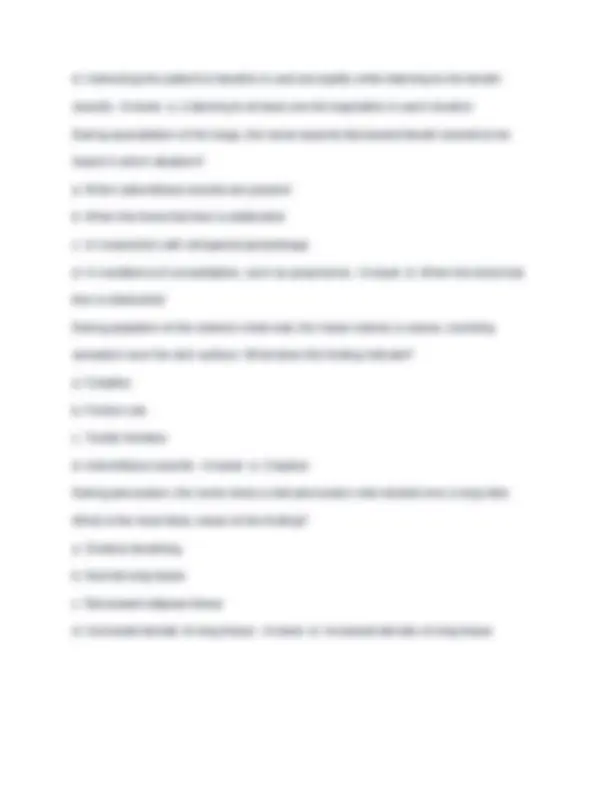
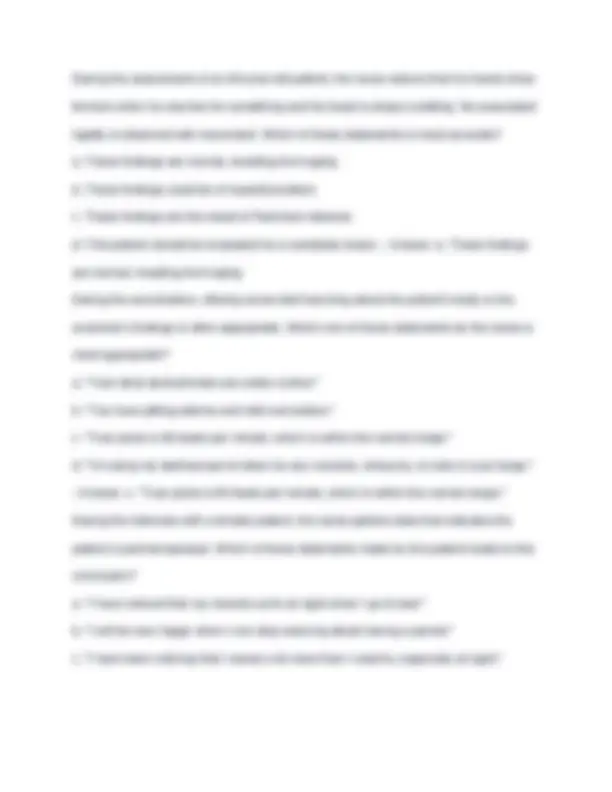
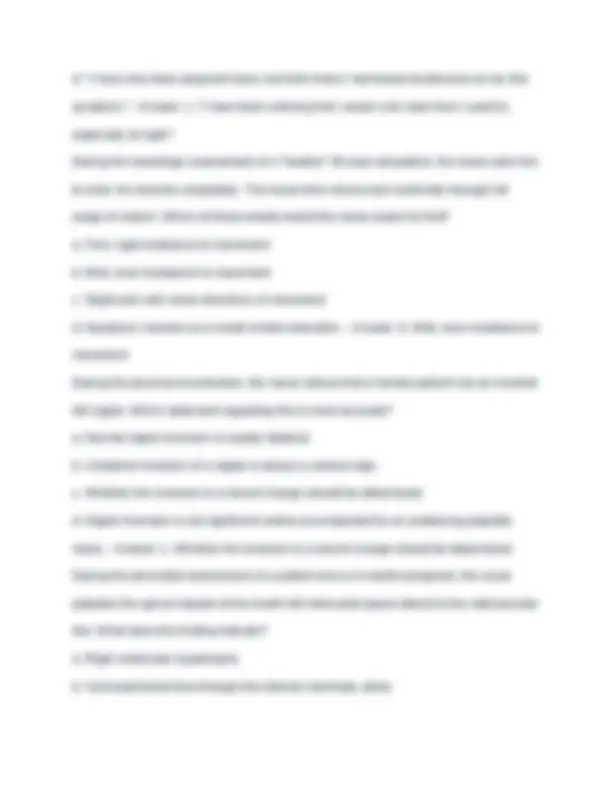
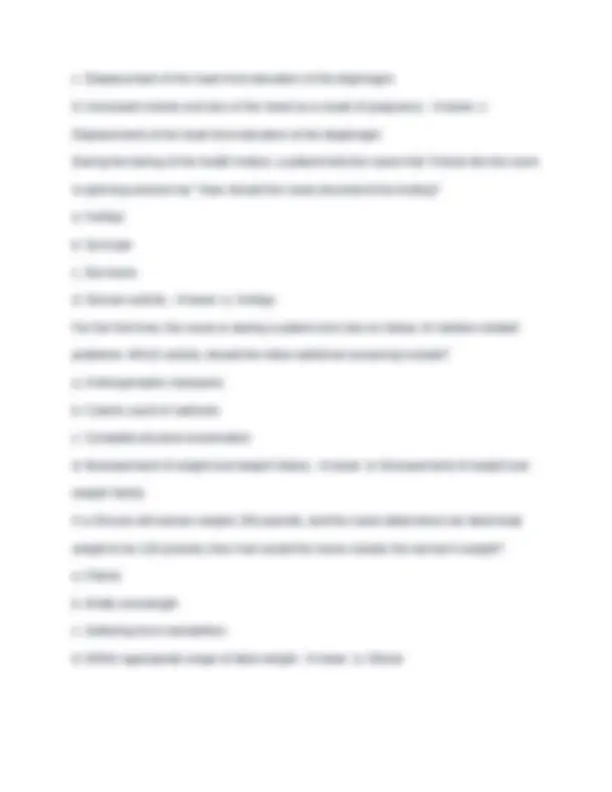
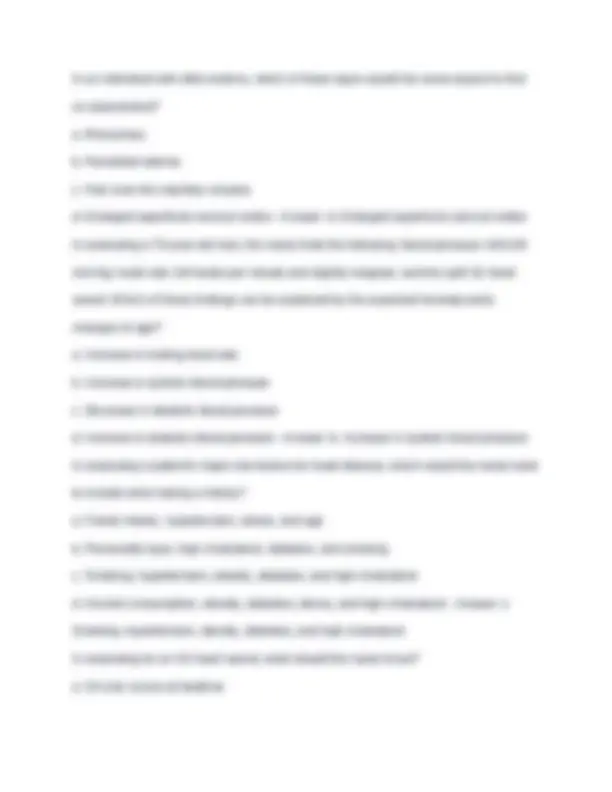
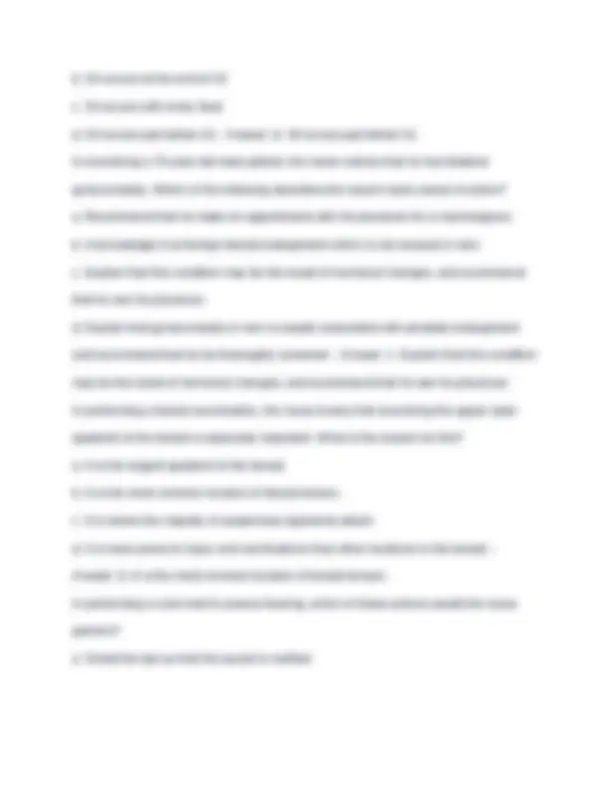
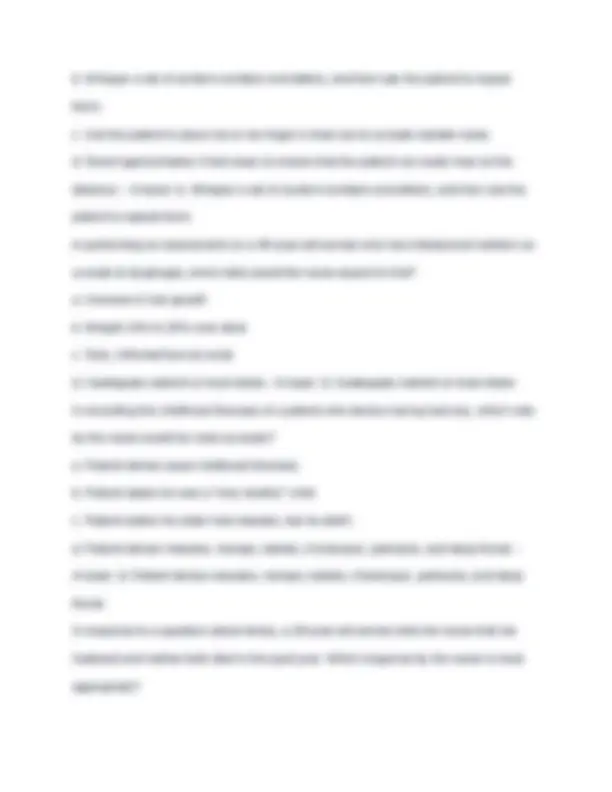
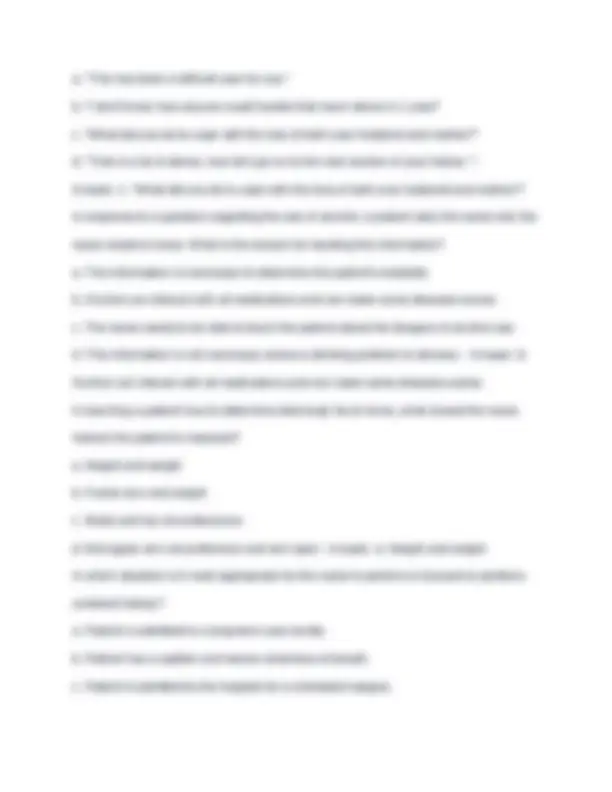
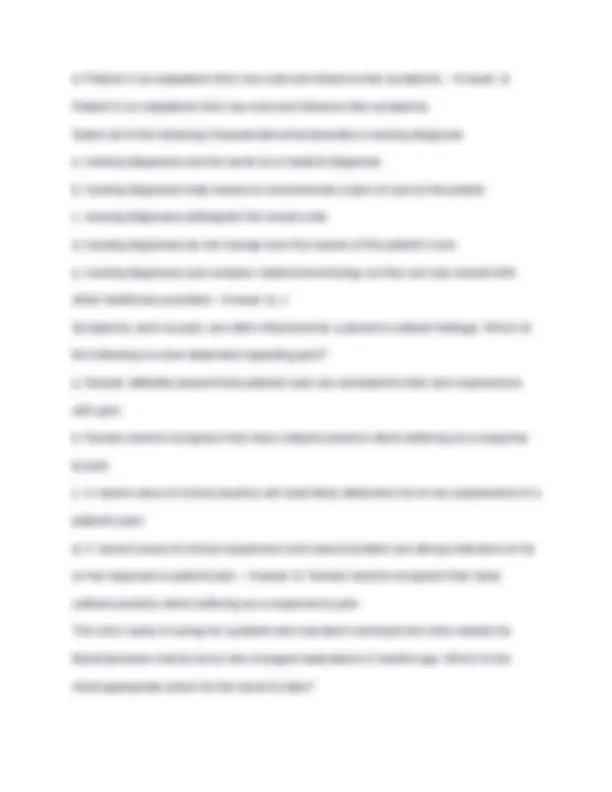
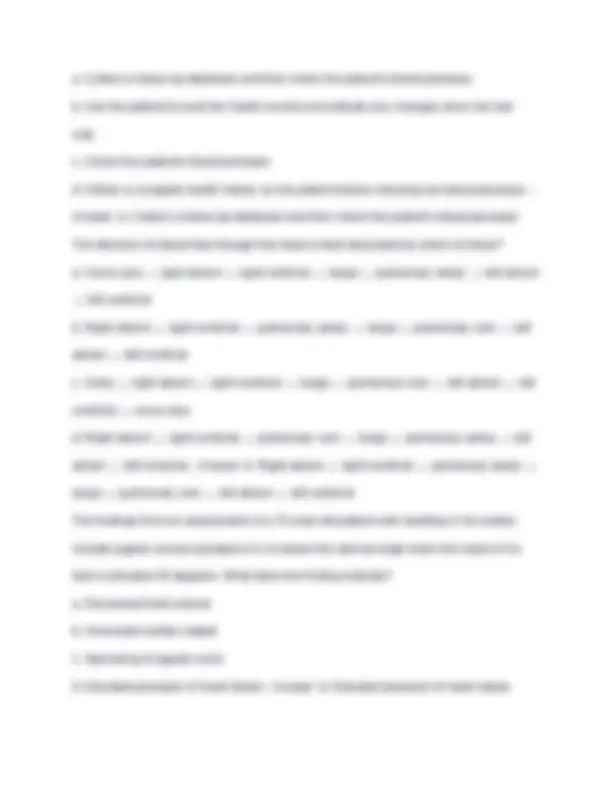
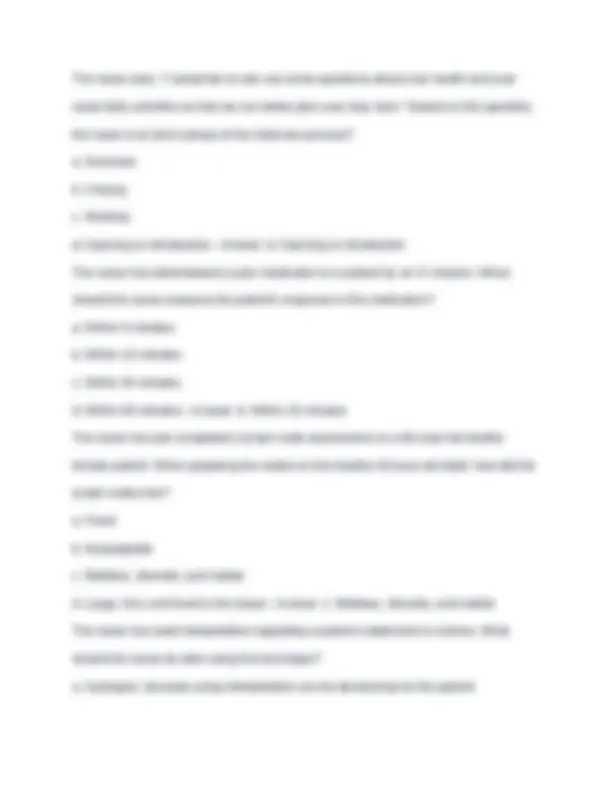
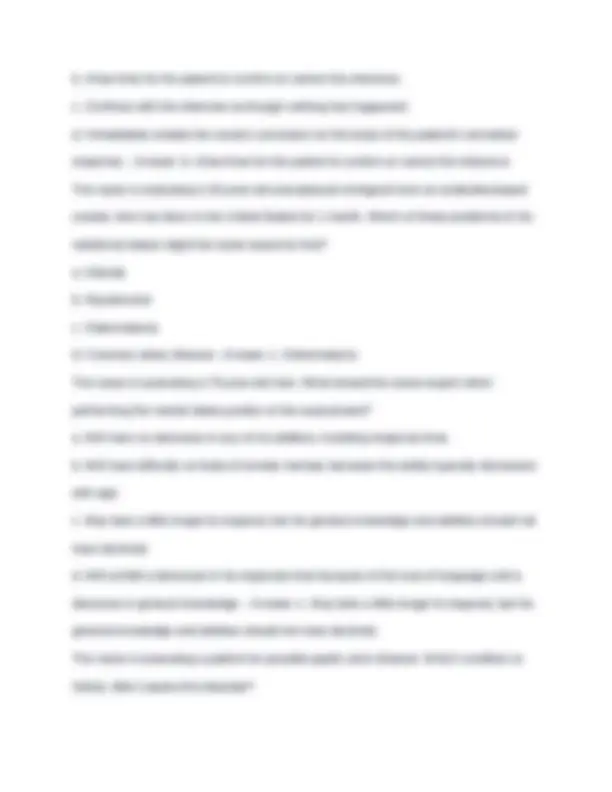
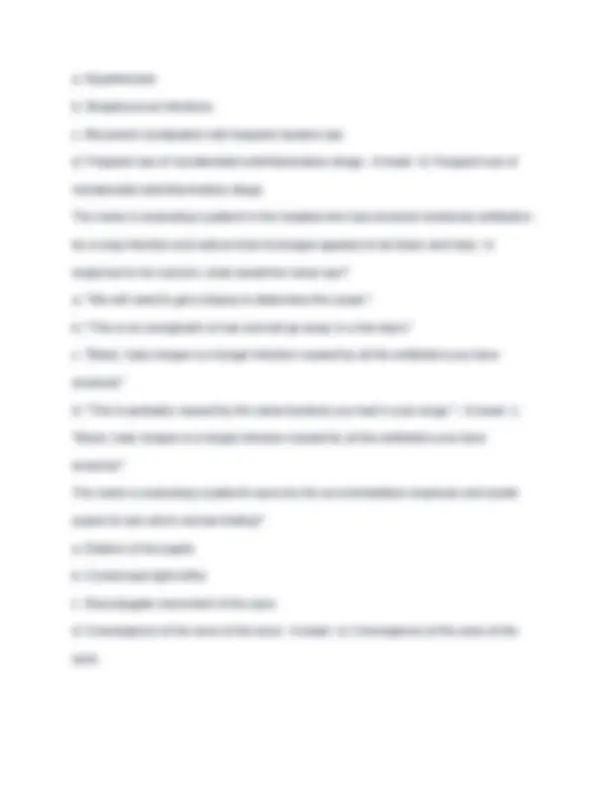
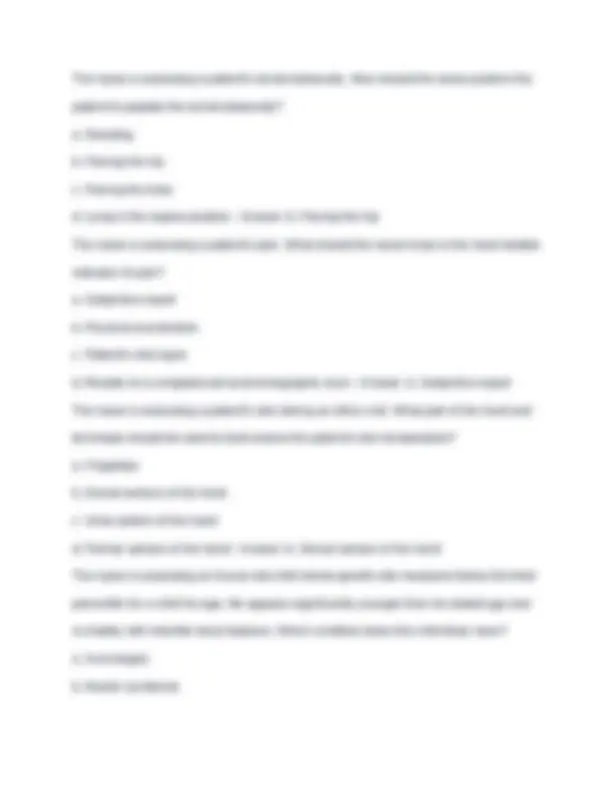
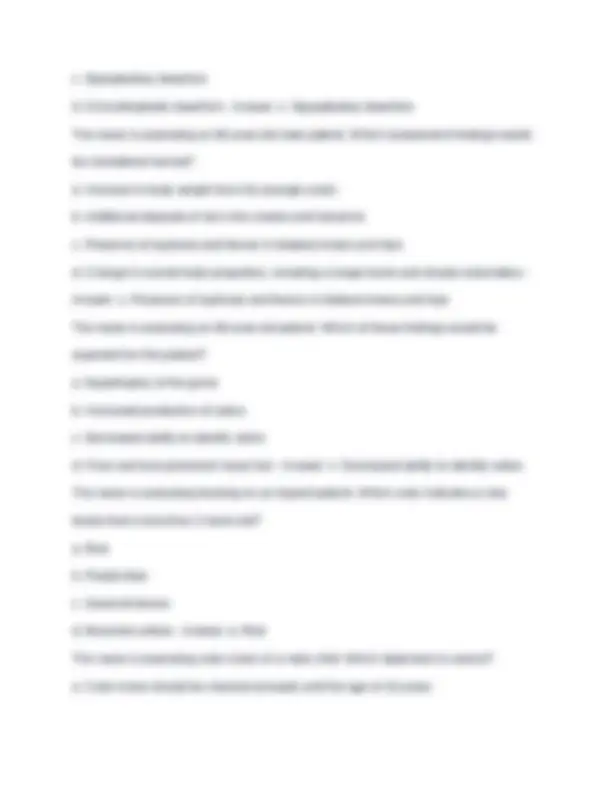
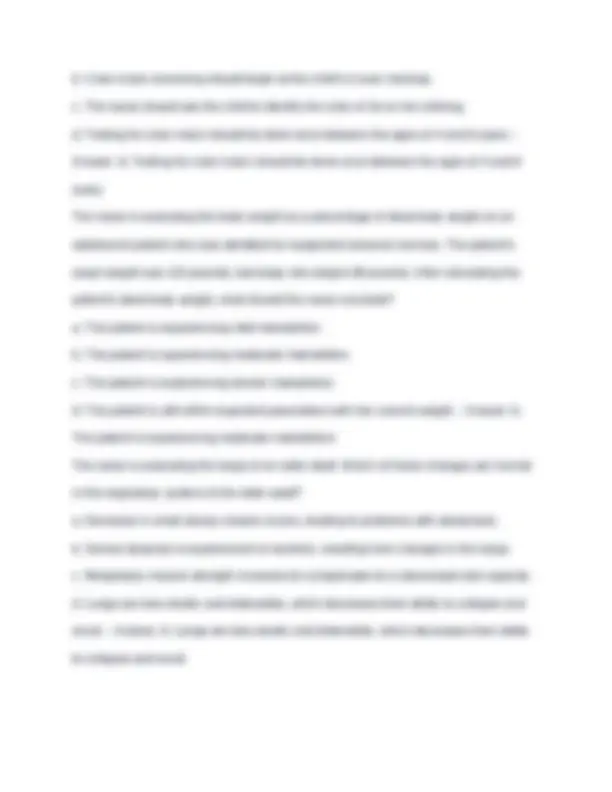
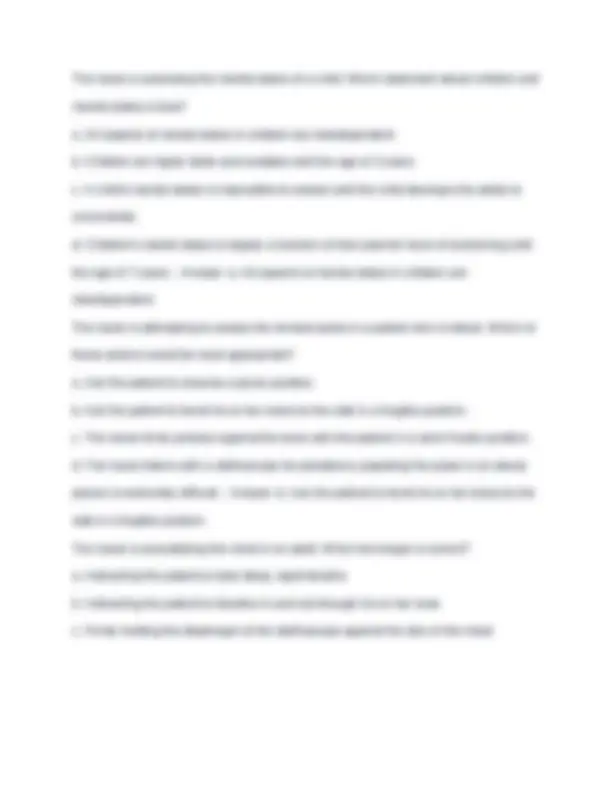
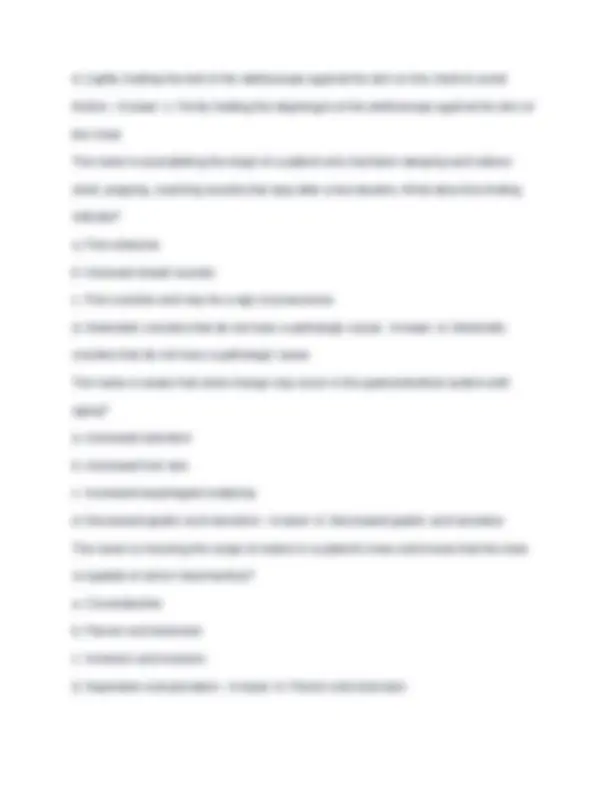
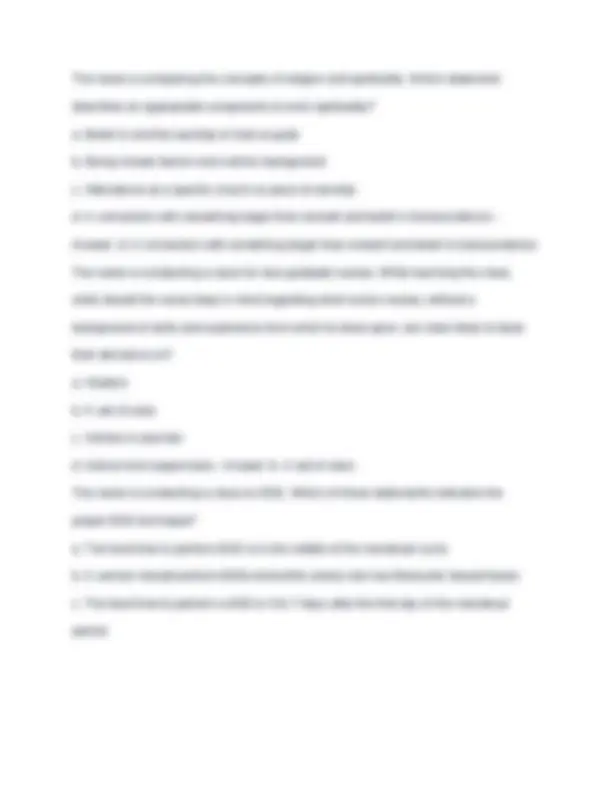
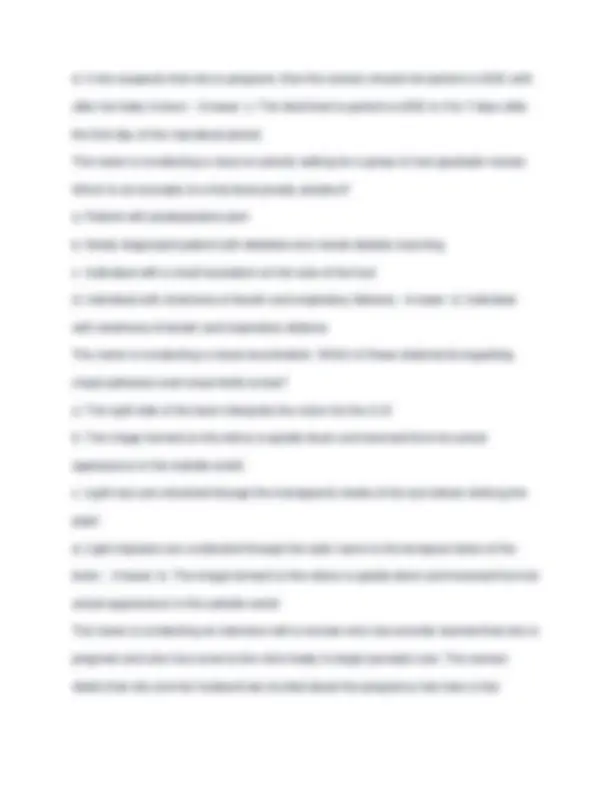
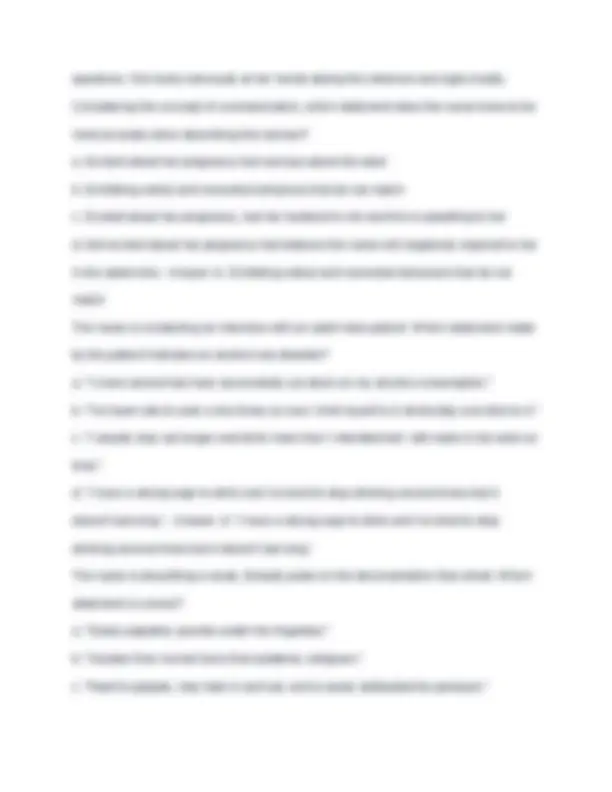
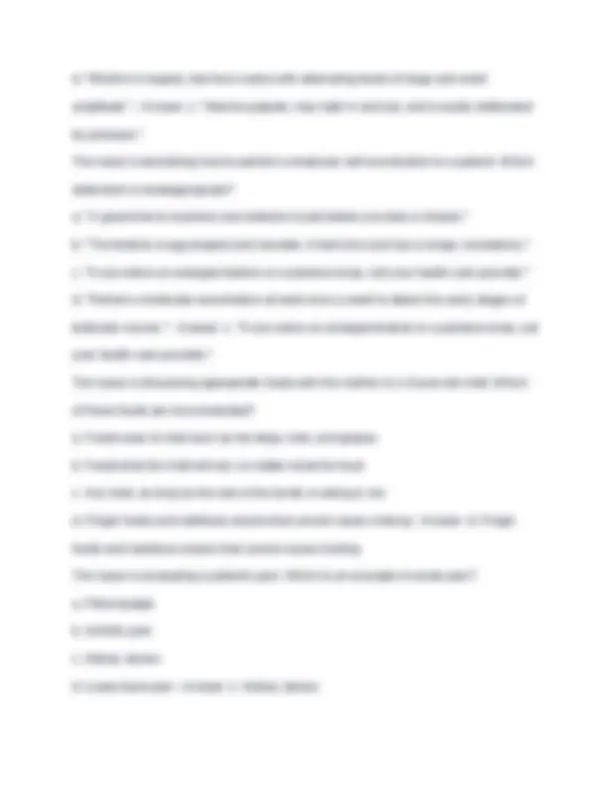
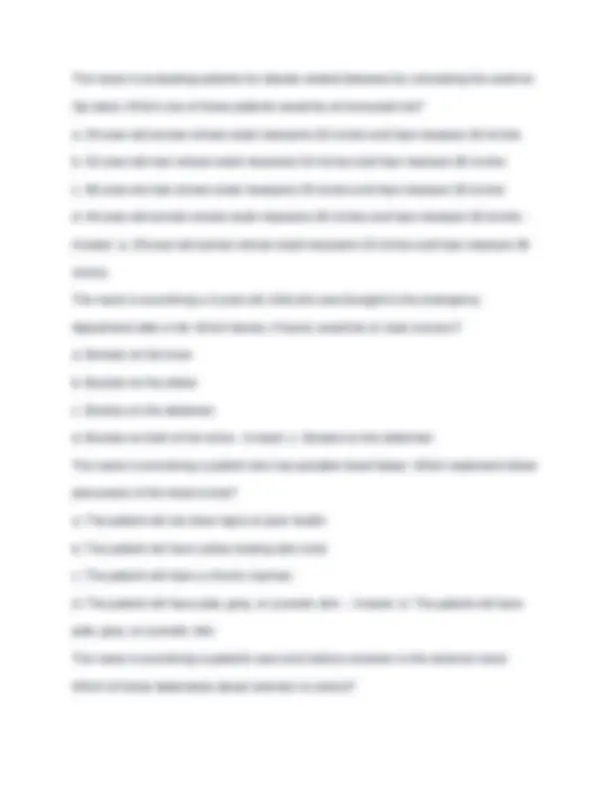
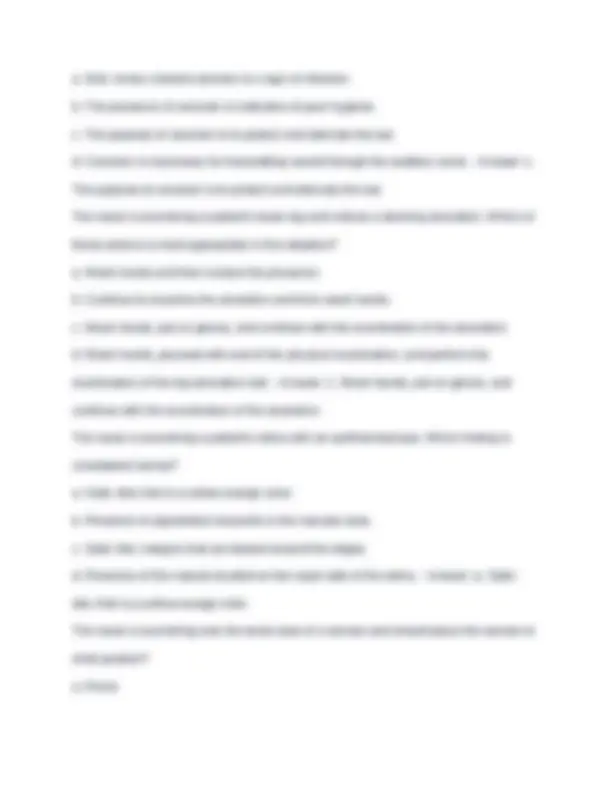
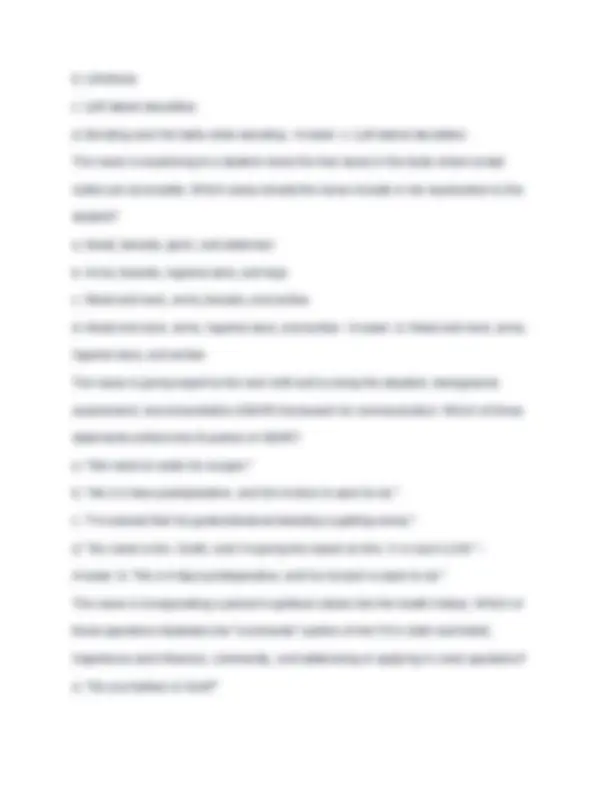
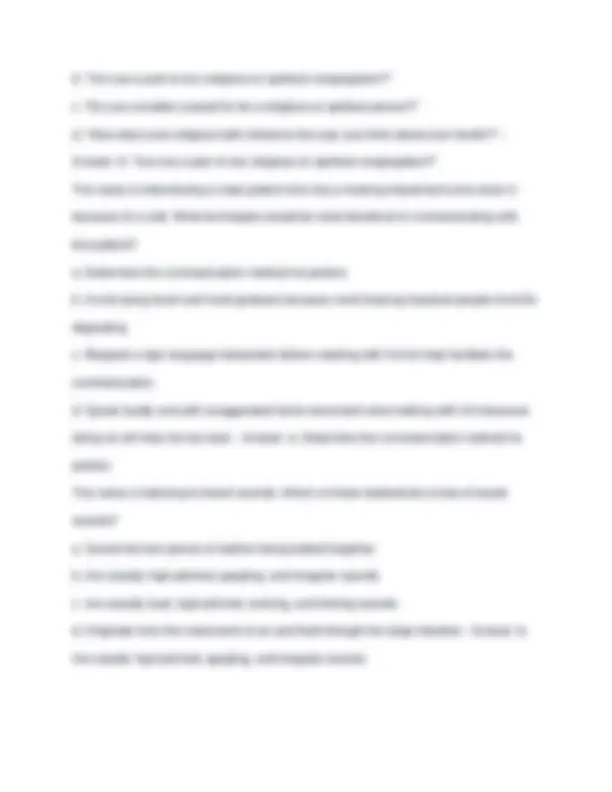
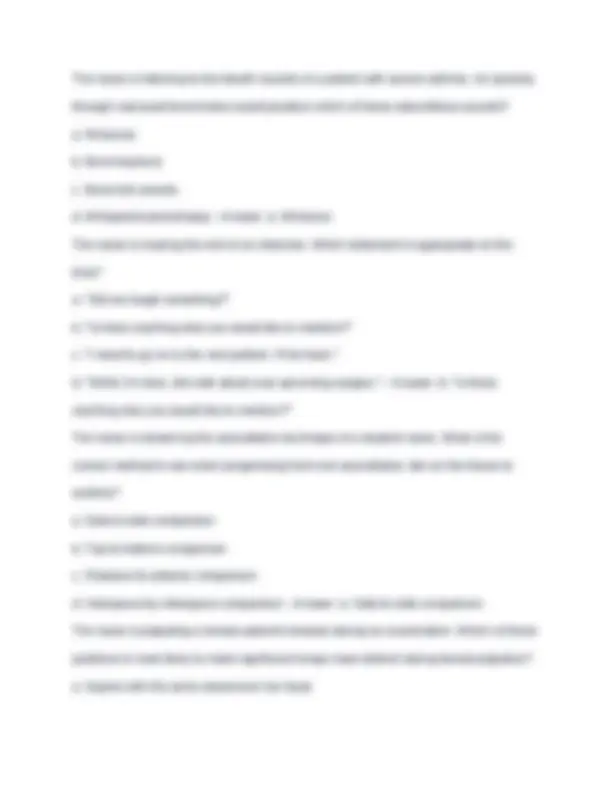
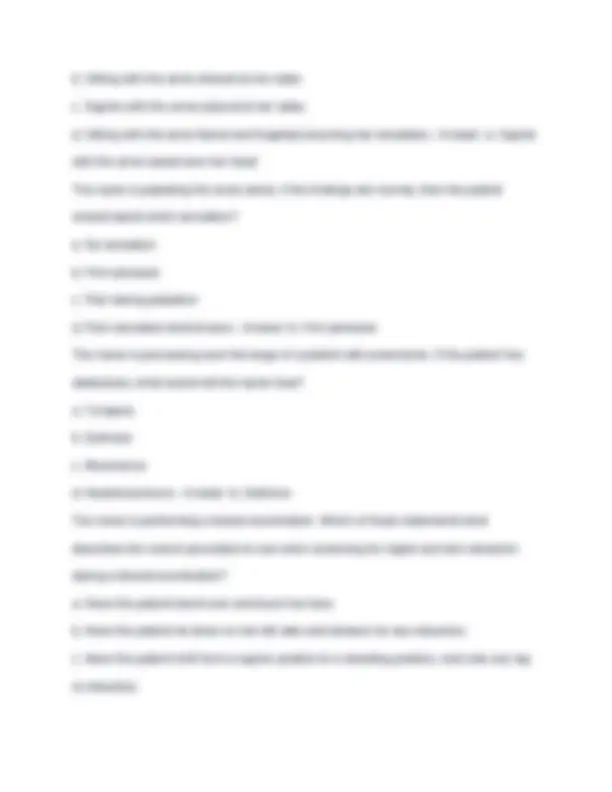
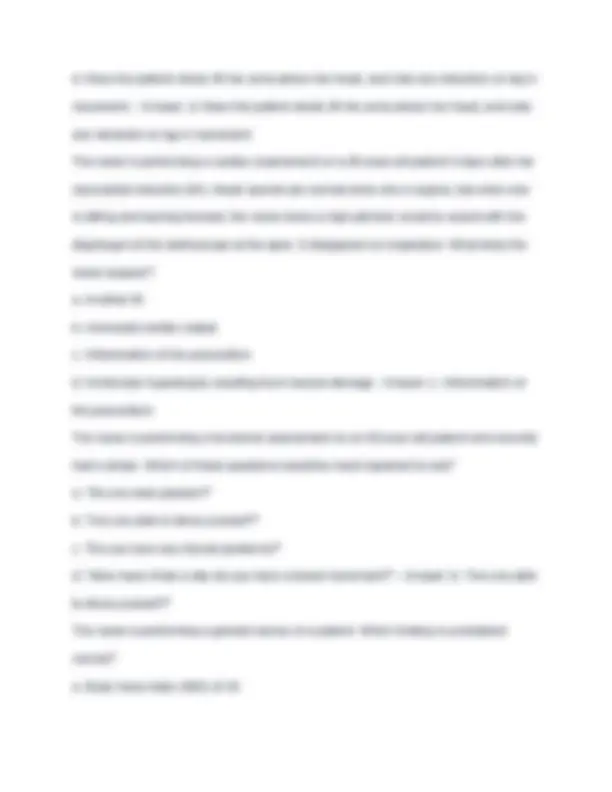
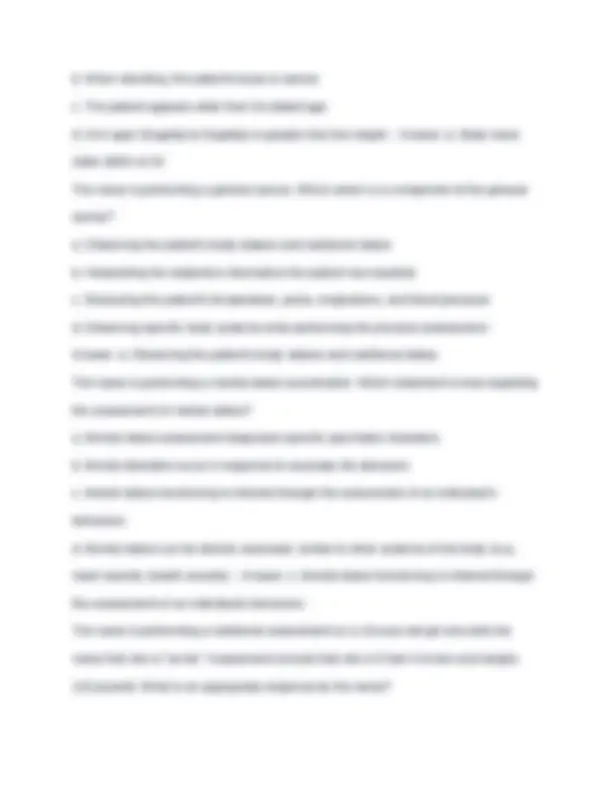
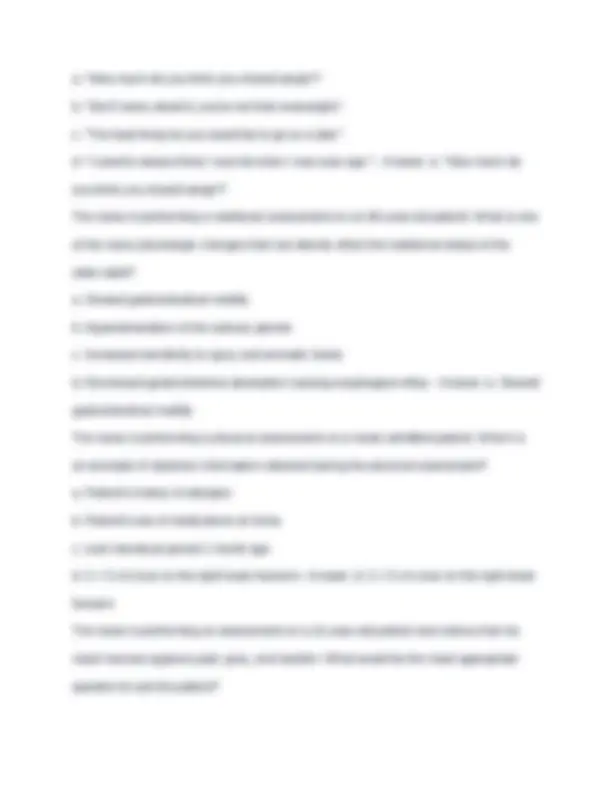
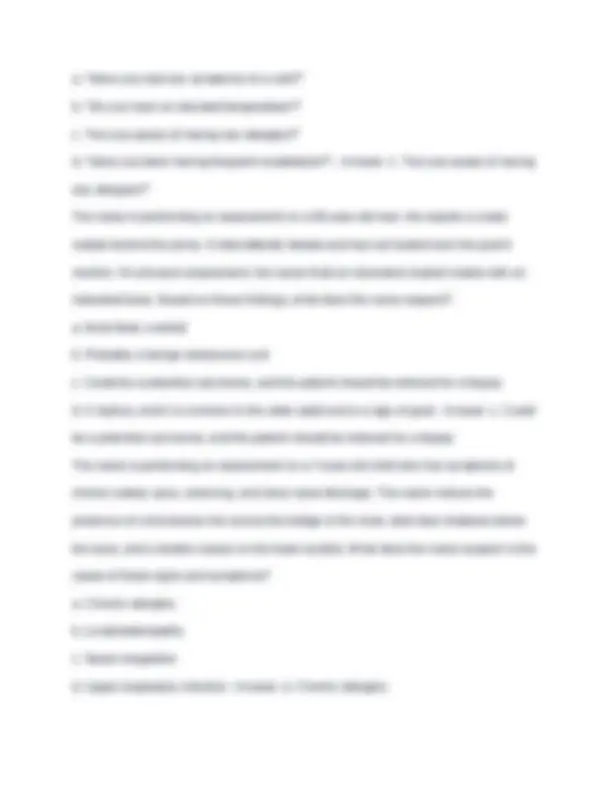
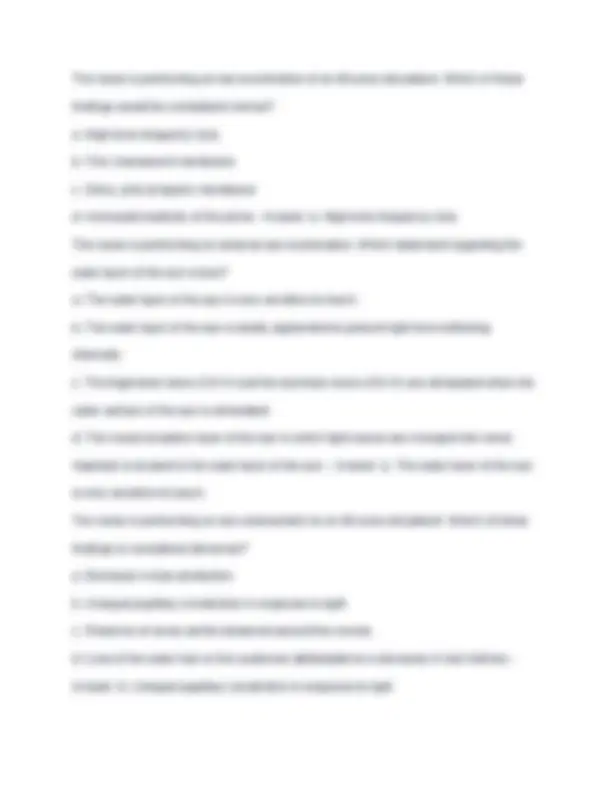
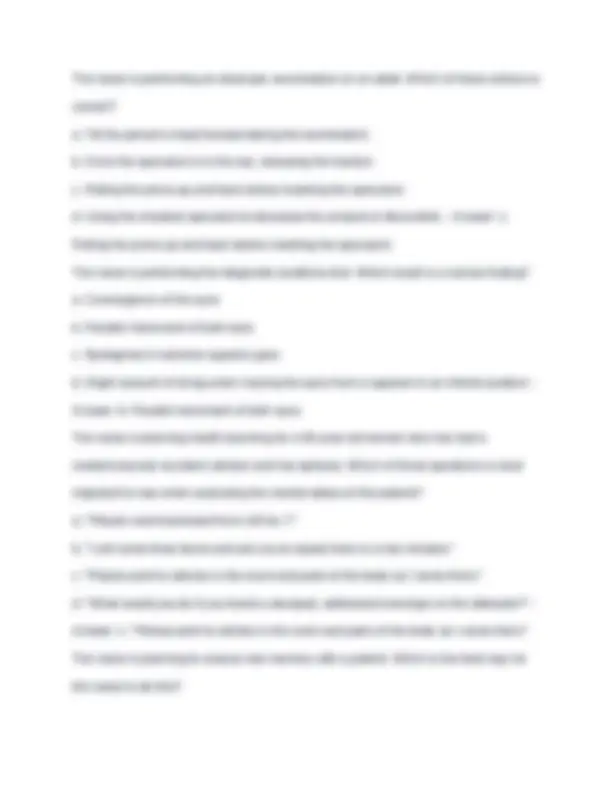
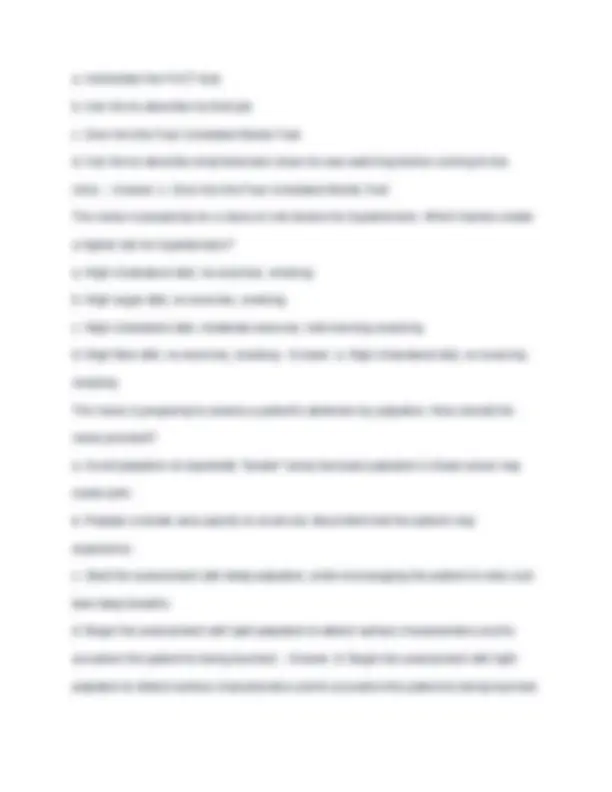
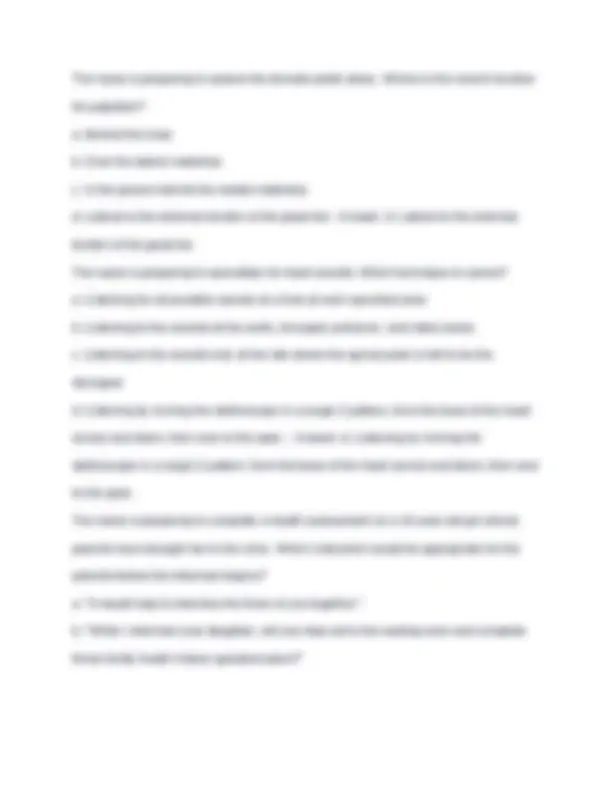
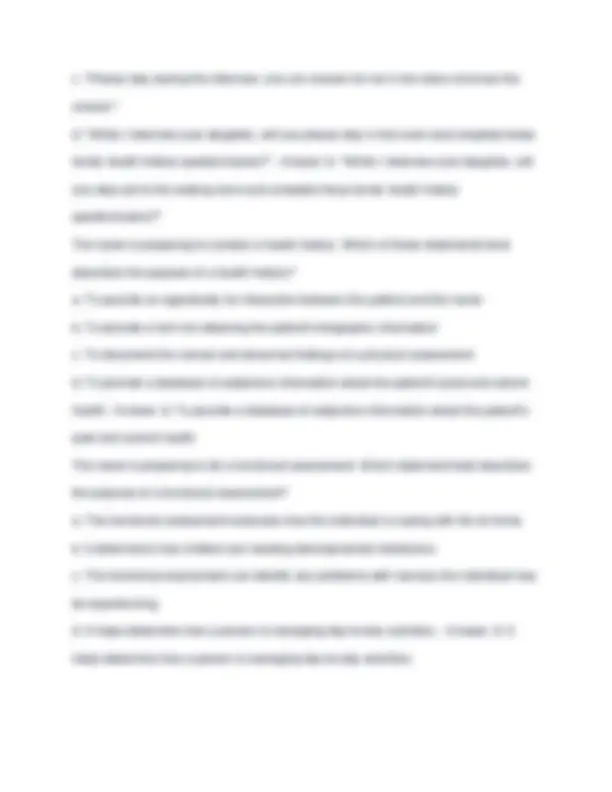
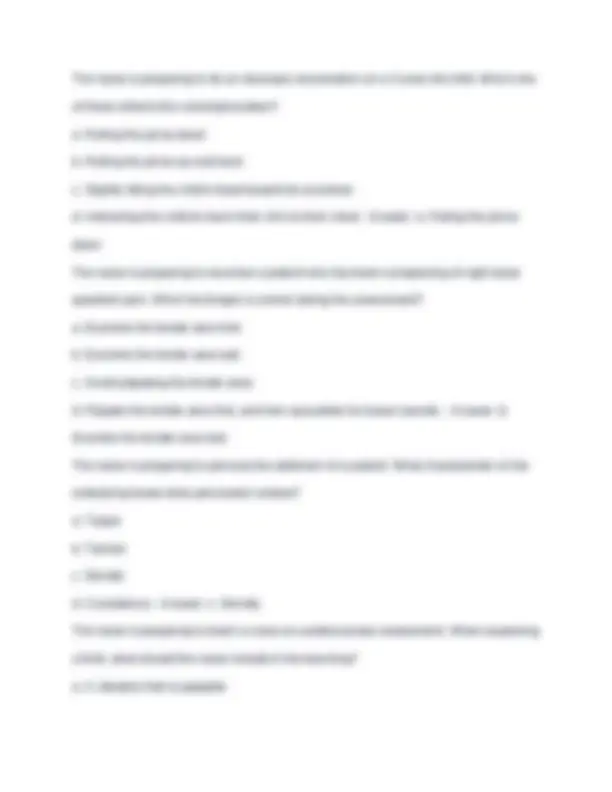
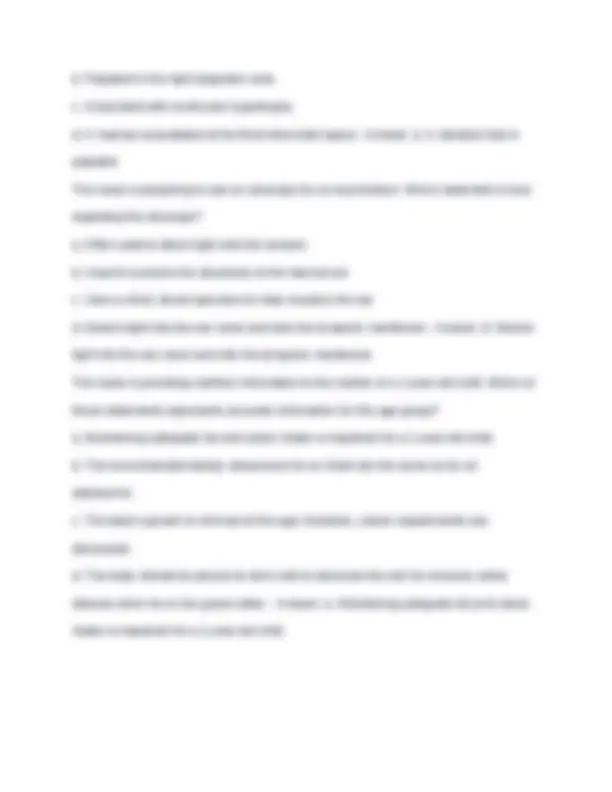
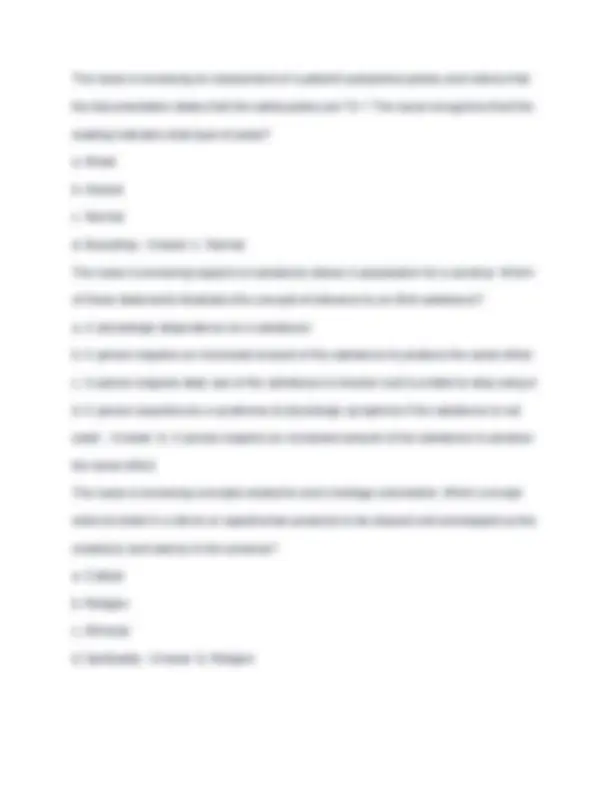
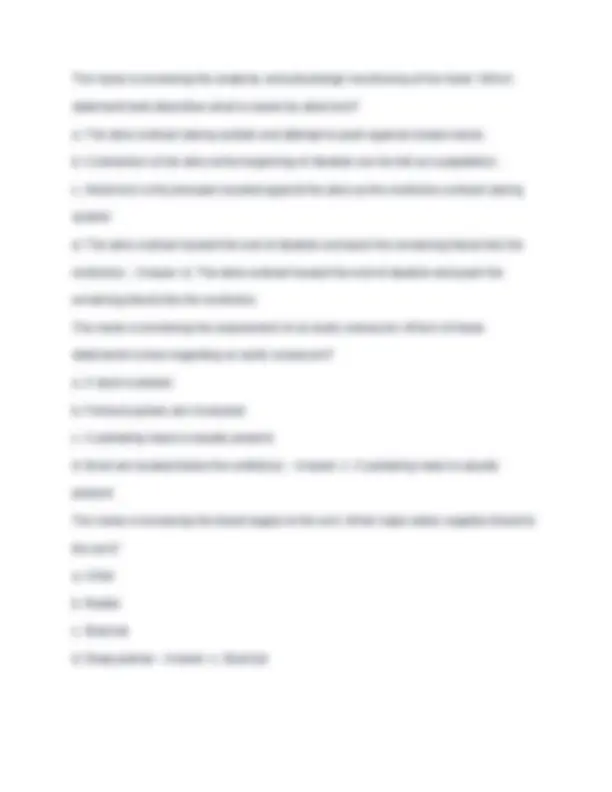
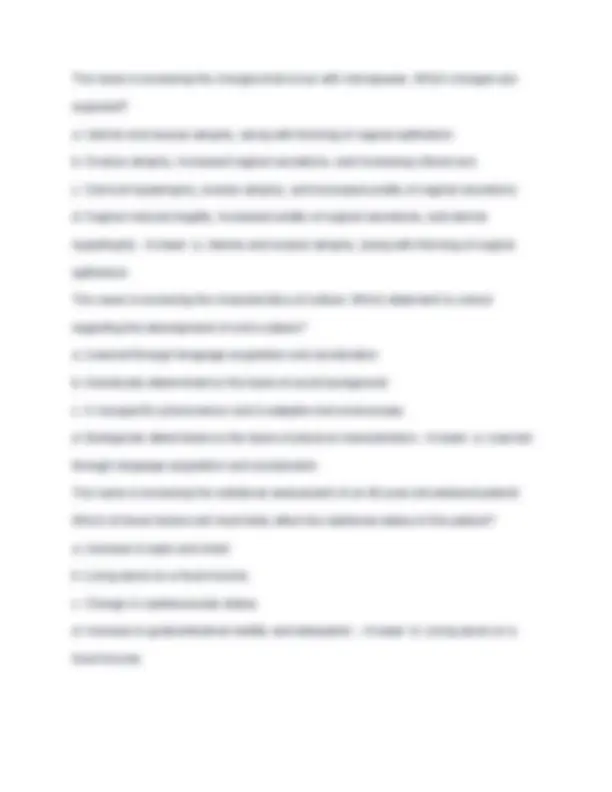
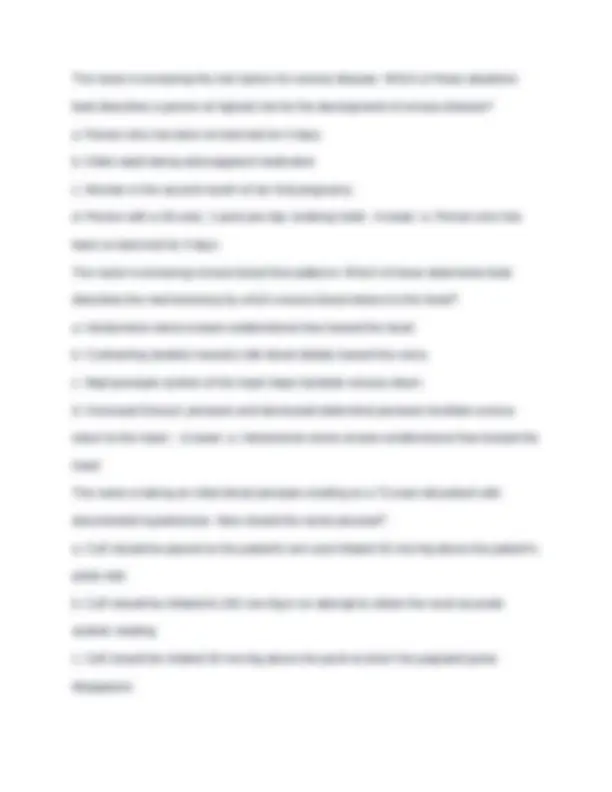
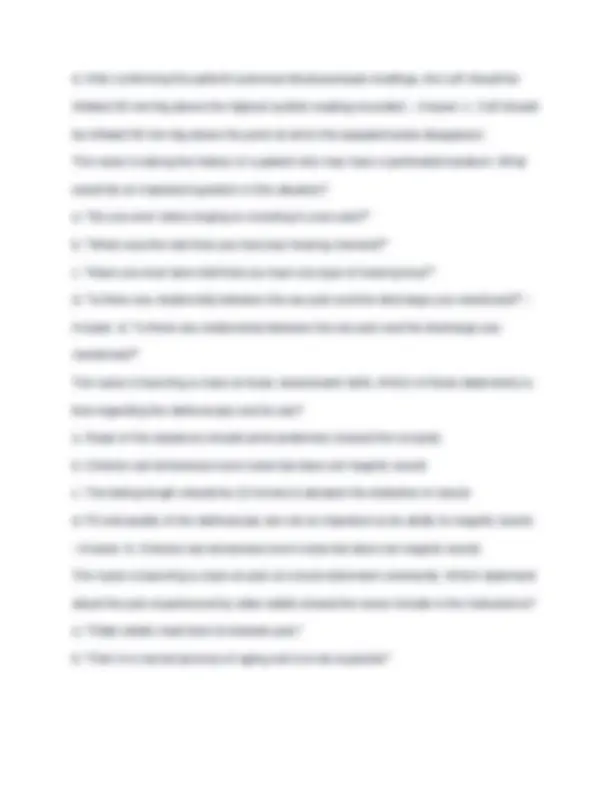


Study with the several resources on Docsity

Earn points by helping other students or get them with a premium plan


Prepare for your exams
Study with the several resources on Docsity

Earn points to download
Earn points by helping other students or get them with a premium plan
Community
Ask the community for help and clear up your study doubts
Discover the best universities in your country according to Docsity users
Free resources
Download our free guides on studying techniques, anxiety management strategies, and thesis advice from Docsity tutors
A series of questions and answers related to nursing assessment techniques, prioritization of patient problems, and identification of health issues. It covers topics such as diet recall, food diaries, food frequency questionnaires, patient interviews, and physical assessments. The document also includes examples of common health issues and their appropriate assessments.
Typology: Exams
1 / 140

This page cannot be seen from the preview
Don't miss anything!





























































































A 16-year-old girl is being seen at the clinic for gastrointestinal complaints and weight loss. The nurse determines that many of her complaints may be r/t erratic eating patterns, eating predominantly fast foods, and high caffeine intake. In this situation, which is most appropriate when collecting current dietary intake information? a. Scheduling a time for direct observation of the adolescent during meals b. Asking the patient for a 24-hour diet recall, and assuming it to be reflective of a typical day for her c. Having the patient complete a food diary for 3 days, including 2 weekdays and 1 weekend day d. Using the food frequency questionnaire to identify the amount of intake of specific foods - Answer :c. Having the patient complete a food diary for 3 days, including 2 weekdays and 1 weekend day A 17-year-old single mother is describing how difficult it is to raise a 3-year-old child by herself. During the course of the interview she states, "I can't believe my boyfriend left me to do this by myself! What a terrible thing to do to me!" Which of these responses by the nurse uses empathy? a. "You feel alone." b. "You can't believe he left you alone?" c. "It must be so hard to care for a child all alone."
d. "I would be angry, too; raising a child alone is no picnic." - Answer :c. "It must be so hard to care for a child all alone." A 17-year-old student is a swimmer on her high school's swim team. She has had three bouts of otitis externa this season and wants to know what to do to prevent it. What should the nurse include in the instructions? a. Use a cotton-tipped swab to dry ear canals thoroughly after each swim. b. Use rubbing alcohol or 2% acetic acid eardrops after every swim. c. Irrigate the ears with warm water and a bulb syringe after each swim. d. Rinse the ears with a warmed solution of mineral oil and hydrogen peroxide. - Answer :b. Use rubbing alcohol or 2% acetic acid eardrops after every swim. A 19-year-old college student is brought to the emergency department with a severe headache he describes as, "Like nothing I've ever had before." His temperature is 40° C, and he has a stiff neck. The nurse looks for other signs and symptoms of which problem? a. Head injury b. Cluster headache c. Migraine headache d. Meningeal inflammation - Answer :d. Meningeal inflammation A 21-year-old woman has been on a low-protein liquid diet for the past 2 months. She has had adequate intake of calories and appears well nourished. After further assessment, what would the nurse expect to find? a. Poor skin turgor b. Decreased serum albumin
examination, the patient has severe pain when the uterus and cervix are moved. What do these findings suggest? a. Endometriosis b. Uterine fibroids c. Ectopic pregnancy d. Pelvic inflammatory disease - Answer :d. Pelvic inflammatory disease A 25-year-old woman in her fifth month of pregnancy has a blood pressure of 100/ mm Hg. In reviewing her previous examination, the nurse notes that her blood pressure in her second month was 124/80 mm Hg. In evaluating this change, what does the nurse know to be true? a. This decline in blood pressure is the result of peripheral vasodilatation and is an expected change. b. Because of increased cardiac output, the blood pressure should be higher at this time. c. This change in blood pressure is not an expected finding because it means a decrease in cardiac output. d. This decline in blood pressure means a decrease in circulating blood volume, which is dangerous for the fetus. - Answer :a. This decline in blood pressure is the result of peripheral vasodilatation and is an expected change. A 30-year-old female patient is describing feelings of hopelessness and depression. She has attempted self-mutilation and has a history of suicide attempts. She describes difficulty sleeping at night and has lost 10 pounds in the past month. Which of these statements or questions is the nurse's best response in this situation?
a. "Do you have a weapon?" b. "How do other people treat you?" c. "Are you feeling so hopeless that you feel like hurting yourself now?" d. "People often feel hopeless, but the feelings resolve within a few weeks." - Answer :c. "Are you feeling so hopeless that you feel like hurting yourself now?" A 30-year-old woman is visiting the clinic because of "pain in my bottom when I have a bowel movement." The nurse should assess for which problem? a. Pinworms b. Hemorrhoids c. Colon cancer d. Fecal incontinence - Answer :b. Hemorrhoids A 30-year-old woman with a history of mitral valve problems states that she has been "very tired." She has started waking up at night and feels like her "heart is pounding." During the assessment, the nurse palpates a thrill and lift at the fifth left intercostal space midclavicular line. In the same area, the nurse also auscultates a blowing, swishing sound right after the S1. What do these findings most likely indicate? a. Heart failure b. Aortic stenosis c. Pulmonary edema d. Mitral regurgitation - Answer :d. Mitral regurgitation A 32-year-old woman tells the nurse that she has noticed "very sudden, jerky movements" mainly in her hands and arms. She says, "They seem to come and go,
A 4-year-old boy is brought to the emergency department by his mother. She says he points to his stomach and says, "It hurts so bad." Which pain assessment tool would be the best choice when assessing this child's pain? a. Descriptor scale b. Numeric rating scale c. Brief pain inventory d. Faces Pain Scale-Revised (FPS-R) - Answer :d. Faces Pain Scale-Revised (FPS-R) A 40-year-old man has come into the clinic reporting extreme pain in his toes. The nurse notices that his toes are slightly swollen, reddened, and warm to the touch. What does the nurse suspect? a. Acute gout b. Osteoporosis c. Ankylosing spondylitis d. Degenerative joint disease - Answer :a. Acute gout A 40-year-old man states that his physician told him that he has a hernia. He asks the nurse to explain what a hernia is. Which response by the nurse is appropriate? a. "No need to worry. Most men your age develop hernias." b. "A hernia is a loop of bowel protruding through a weak spot in the abdominal muscles." c. "A hernia is the result of prenatal growth abnormalities that are just now causing problems." d. "I'll have to have your physician explain this to you." - Answer :b. "A hernia is a loop of bowel protruding through a weak spot in the abdominal muscles."
A 42-year-old patient of Asian descent is being seen at the clinic for an initial examination. Why is it important for the nurse to consider the basics of the patient's culture during the patient's health assessment? a. Identify the cause of his illness. b. Make accurate disease diagnoses. c. The U.S. is becoming increasingly diverse. d. Provide culturally relevant health care. - Answer :d. Provide culturally relevant health care. A 45-year-old man is in the clinic for a routine physical examination. During the recording of his health history, the patient states that he has been having difficulty sleeping. "I'll be sleeping great, and then I wake up and feel like I can't get my breath." Which is the best response by the nurse? a. "When was your last electrocardiogram?" b. "It's probably because it's been so hot at night." c. "Do you have any history of problems with your heart?" d. "Have you had a recent sinus infection or upper respiratory infection?" - Answer :c. "Do you have any history of problems with your heart?" A 50-year-old patient has been brought to the emergency department after a housemate found that the patient could not get out of bed alone. He has lived in a group home for years but for several months has not participated in the activities and has stayed in his room. The nurse assesses for signs of undernutrition, and an x-ray study reveals that he has osteomalacia. What deficiency is likely the cause? a. Iron
c. Urge incontinence d. Stress incontinence - Answer :d. Stress incontinence A 54-year-old man comes to the clinic with a "horrible problem." He tells the nurse that he has just discovered a lump on his breast and is fearful of cancer. The nurse knows which statement about breast cancer in men is true? a. Breast cancer in men rarely spreads to the lymph nodes. b. Less than one percent of all breast cancers occurs in men. c. Most breast masses in men are diagnosed as gynecomastia. d. Breast masses in men are difficult to detect because of minimal breast tissue. - Answer :a. Breast cancer in men rarely spreads to the lymph nodes. A 55-year-old postmenopausal woman is being seen in the clinic for her annual examination. She is concerned about changes in her breasts that she has noticed over the past 5 years. She states that her breasts have decreased in size and that the elasticity has changed so that her breasts seem "flat and flabby." Which is the best reply by the nurse? a. "This change occurs most often because of long-term use of bras that do not provide enough support to the breast tissues." b. "Decreases in hormones after menopause causes atrophy of the glandular tissue in the breast and is a normal process of aging." c. "This is a normal change that occurs as women get older and is due to the increased levels of progesterone during the aging process." d. "Postural changes in the spine make it appear that your breasts have changed in shape. Exercises to strengthen the muscles of the upper back and chest wall will help
prevent the change - Answer :b. "Decreases in hormones after menopause causes atrophy of the glandular tissue in the breast and is a normal process of aging." A 59-year-old patient has been diagnosed with prostatitis and is being seen at the clinic for reports of burning and pain during urination. How should the nurse document this finding? a. Dysuria b. Nocturia c. Polyuria d. Hematuria - Answer :a. Dysuria A 59-year-old patient tells the nurse that he has ulcerative colitis. He has been having "black stools" for the last 24 hours. How would the nurse best document his reason for seeking care? a. J.M. is a 59-year-old man seeking treatment for ulcerative colitis. b. J.M. came into the clinic complaining of having black stools for the past 24 hours. c. J.M. is a 59-year-old man who states that he has ulcerative colitis and wants it checked. d. J.M. is a 59-year-old man who states that he has been having "black stools" for the past 24 hours. - Answer :d. J.M. is a 59-year-old man who states that he has been having "black stools" for the past 24 hours. A 60-year-old man has just been told that he has benign prostatic hypertrophy (BPH). He has a friend who just died from cancer of the prostate and is concerned this will happen to him. How should the nurse respond? a. "The swelling in your prostate is only temporary and will go away."
A 65-year-old patient remarks that she just cannot believe that her breasts "sag so much." She states it must be from a lack of exercise. What explanation should the nurse offer her? a. After menopause, only women with large breasts experience sagging. b. After menopause, sagging is usually due to decreased muscle mass within the breast. c. After menopause, a diet that is high in protein will help maintain muscle mass, which keeps the breasts from sagging. d. After menopause, the glandular and fat tissue atrophies, causing breast size and elasticity to diminish, resulting in breasts that sag. - Answer :d. After menopause, the glandular and fat tissue atrophies, causing breast size and elasticity to diminish, resulting in breasts that sag. A 65-year-old patient with a history of heart failure comes to the clinic stating "I keep waking up from sleep with shortness of breath." Which action by the nurse is most appropriate? a. Obtain a detailed health history of the patient's allergies and a history of asthma. b. Tell the patient to sleep on his or her right side to facilitate ease of respirations. c. Assess for other signs and symptoms of paroxysmal nocturnal dyspnea. d. Assure the patient that paroxysmal nocturnal dyspnea is normal and will probably resolve within the next week. - Answer :c. Assess for other signs and symptoms of paroxysmal nocturnal dyspnea.
A 65-year-old woman is in the office for routine gynecologic care. She had a complete hysterectomy 3 months ago after cervical cancer was detected. Which statement does the nurse know to be true regarding this visit? a. Her cervical mucosa will be red and dry looking. b. She will not need to have a Pap smear performed. c. The nurse can expect to find that her uterus will be somewhat enlarged and her ovaries small and hard. d. The nurse should plan to lubricate the instruments and the examining hand adequately to avoid a painful examination. - Answer :d. The nurse should plan to lubricate the instruments and the examining hand adequately to avoid a painful examination. A 67-year-old patient states that he recently began to have pain in his left calf when climbing the 10 stairs to his apartment. This pain is relieved by sitting for "a couple of minutes"; then he is able to resume his activities. What do these symptoms suggest? a. Claudication b. Sore muscles c. Muscle cramps d. Venous insufficiency - Answer :a. Claudication A 68-year-old woman is in the eye clinic for a checkup. She tells the nurse that she has been having trouble reading the paper, sewing, and even seeing the faces of her grandchildren. On examination, the nurse notes that she has some loss of central vision but her peripheral vision is normal. What do these findings suggest? a. Macular degeneration
swooshing sound when listening to the heart. She recognizes this sound is most likely what? a. Split S b. A murmur c. Wheezing d. Summation sound - Answer :b. A murmur A 78-year-old man has a history of a cerebrovascular accident. The nurse notes that when he walks, his left arm is immobile against the body with flexion of the shoulder, elbow, wrist, and fingers and adduction of the shoulder. His left leg is stiff and extended and circumducts with each step. What type of gait disturbance is this individual experiencing? a. Scissors gait b. Cerebellar ataxia c. Parkinsonian gait d. Spastic hemiparesis - Answer :d. Spastic hemiparesis A 9-year-old girl is in the clinic for a sport physical examination. After some initial shyness she finally asks, "Am I normal? I don't seem to need a bra yet, but I have some friends who do. What if I never get breasts?" Which response by the nurse is best? a. "Don't worry, you still have plenty of time to develop." b. "I know just how you feel, I was a late bloomer myself. Just be patient, and they will grow." c. "You will probably get your periods before you notice any significant growth in your breasts."
d. "I understand that it is hard to feel different from your friends. Breasts usually develop between 8 and 10 years of age." - Answer :d. "I understand that it is hard to feel different from your friends. Breasts usually develop between 8 and 10 years of age." A 92-year-old patient has had a stroke. The right side of his face is drooping. The nurse might also suspect which of these assessment findings? a. Epistaxis b. Rhinorrhea c. Dysphagia d. Xerostomia - Answer :c. Dysphagia A female nurse is interviewing a male patient who is near the same age as the nurse. During the interview, the patient makes an overtly sexual comment. Which is the best response by the nurse? a. "Stop that immediately!" b. "Oh, you are too funny. Let's keep going with the interview." c. "Do you really think I would be interested?" d. "It makes me uncomfortable when you talk that way. Please stop." - Answer :d. "It makes me uncomfortable when you talk that way. Please stop." A female patient does not speak English well, and the nurse needs to choose an interpreter. Which of the following would be the most appropriate choice? a. Trained interpreter b. Male family member c. Female family member
d. "That 'soft spot' is normal, and actually allows for growth of the brain during the first year of your baby's life." - Answer :d. "That 'soft spot' is normal, and actually allows for growth of the brain during the first year of your baby's life." A mother brings her 28-month-old daughter into the clinic for a well-child visit. At the beginning of the visit, the nurse focuses attention away from the toddler, but as the interview progresses, the toddler begins to "warm up" and is smiling shyly at the nurse. The nurse will be most successful in interacting with the toddler if which is done next? a. Tickle the toddler, and get her to laugh. b. Stoop down to her level, and ask her about the toy she is holding. c. Continue to ignore her until it is time for the physical examination. d. Ask the mother to leave during the examination of the toddler, because toddlers often fuss less if their parent is not in view. - Answer :b. Stoop down to her level, and ask her about the toy she is holding. A new mother calls the clinic to report that part of her left breast is red, swollen, tender, very hot, and hard. She has a fever of 38.3° C. She also has had symptoms of influenza, such as chills, sweating, and feeling tired. The nurse notices that she has been breastfeeding for 1 month. From her description, what condition does the nurse suspect? a. Mastitis b. Paget disease c. Plugged milk duct d. Mammary duct ectasia - Answer :a. Mastitis
A newly admitted patient is in acute pain, has not been sleeping well lately, and is having difficulty breathing. How should the nurse prioritize these problems? a. Breathing, pain, and sleep b. Breathing, sleep, and pain c. Sleep, breathing, and pain d. Sleep, pain, and breathing - Answer :a. Breathing, pain, and sleep A nurse is assessing a patient's risk for contracting a sexually transmitted infection (STI). What is an appropriate question to ask this patient? a. "Do you have a sexually transmitted infection?" b. "You are aware of the dangers of unprotected sex, aren't you?" c. "You know that it's important to use condoms for protection, right?" d. "Do you use a condom with each episode of sexual intercourse?" - Answer :d. "Do you use a condom with each episode of sexual intercourse?" A nurse is helping at a health fair at a local mall. What should the nurse keep in mind when taking blood pressures on a variety of people? a. After menopause, blood pressure readings in women are usually lower than those taken in men. b. The blood pressure of an African-American adult is usually higher than that of a non- Hispanic White adult of the same age. c. Blood pressure measurements in people who are overweight should be the same as those of people who are at a normal weight.